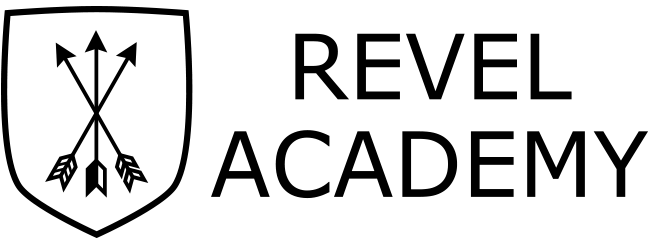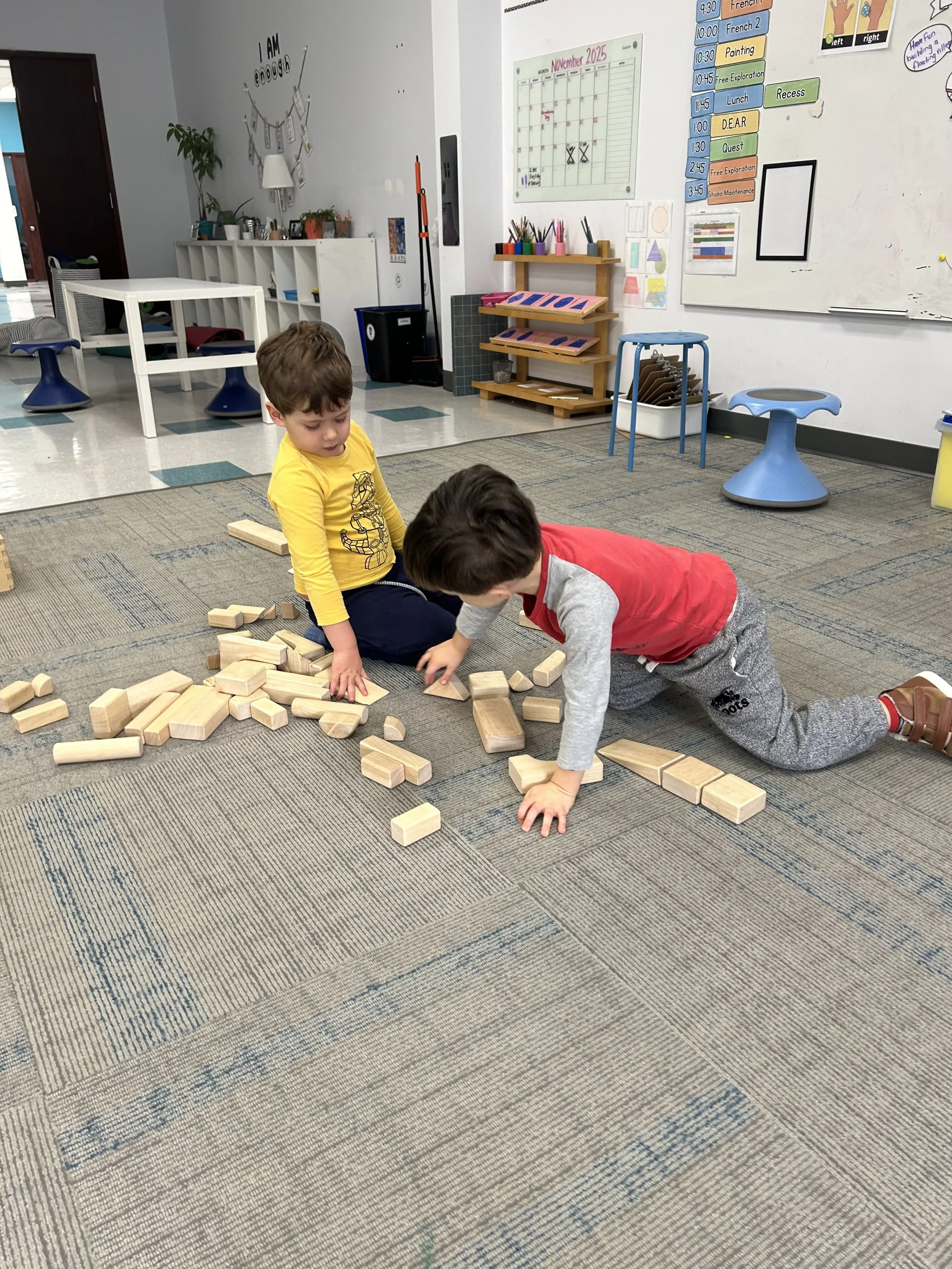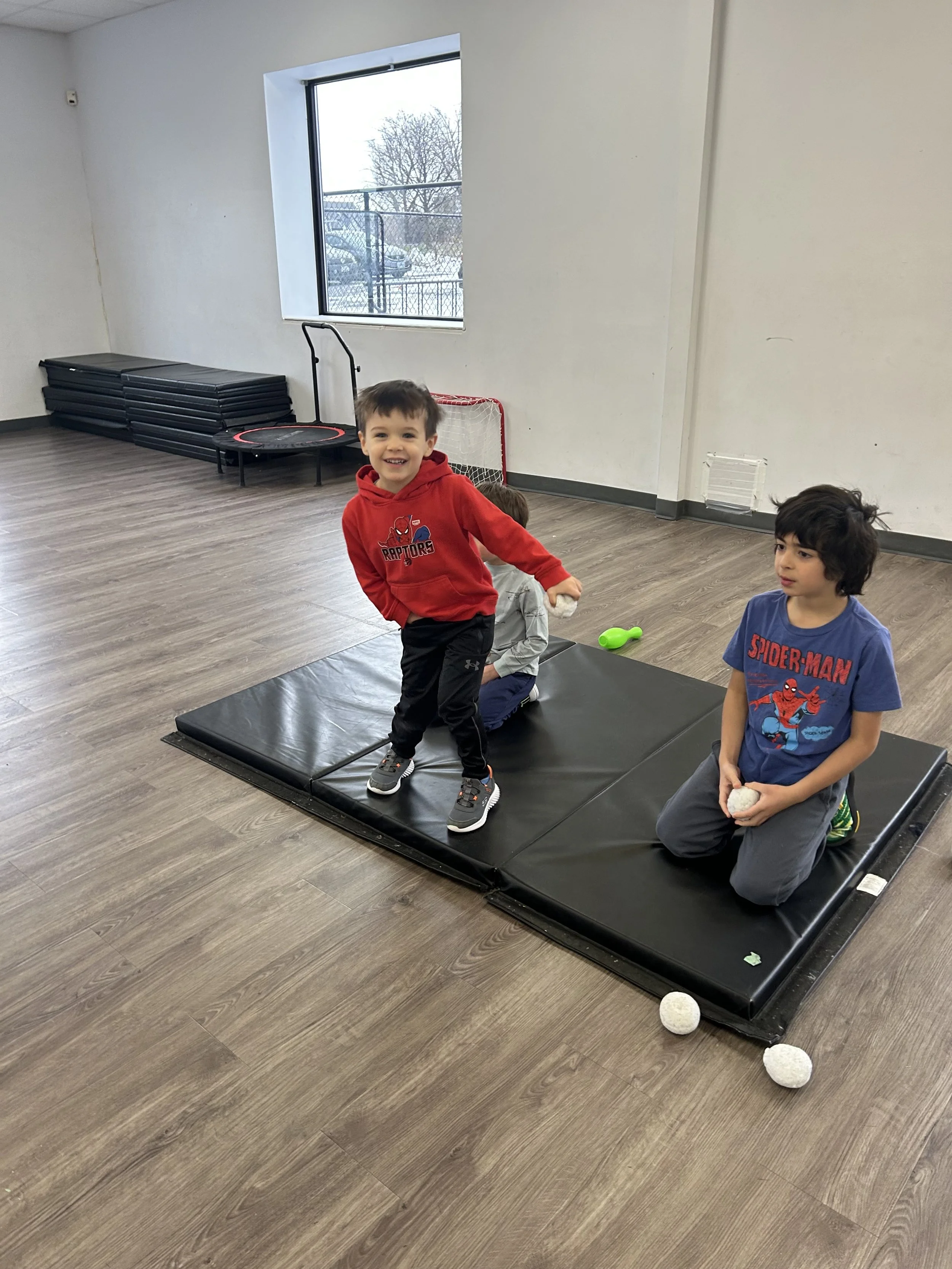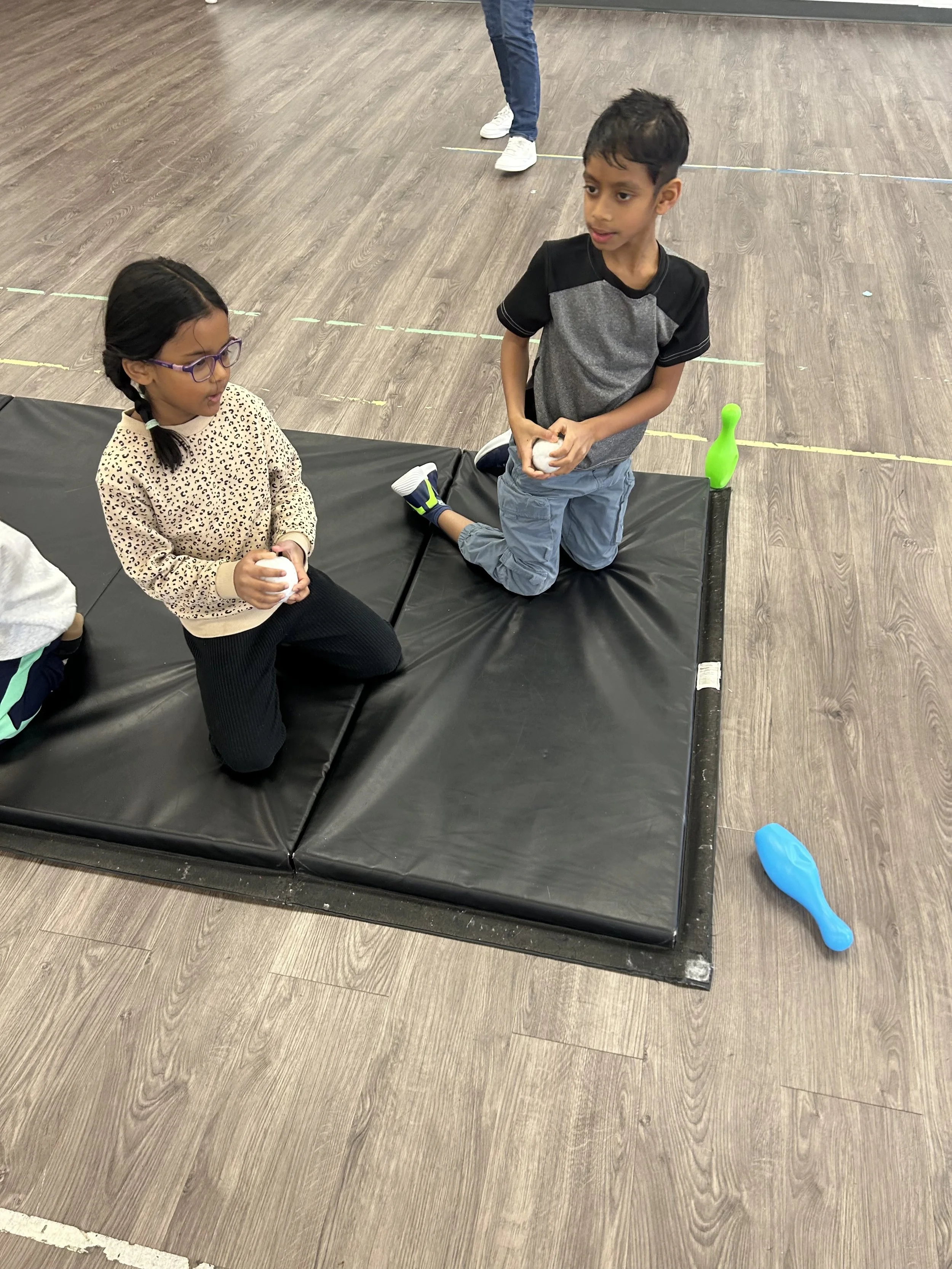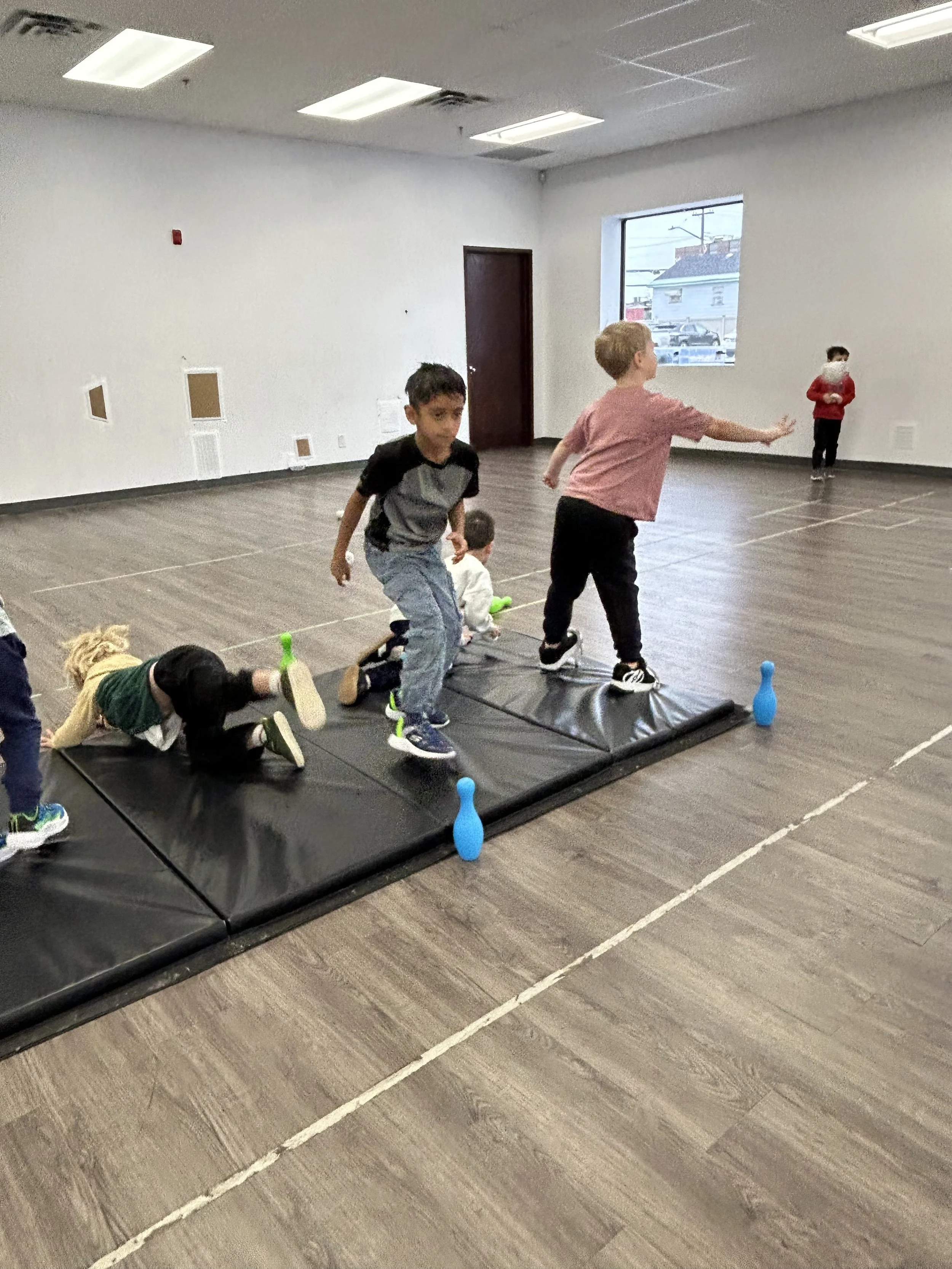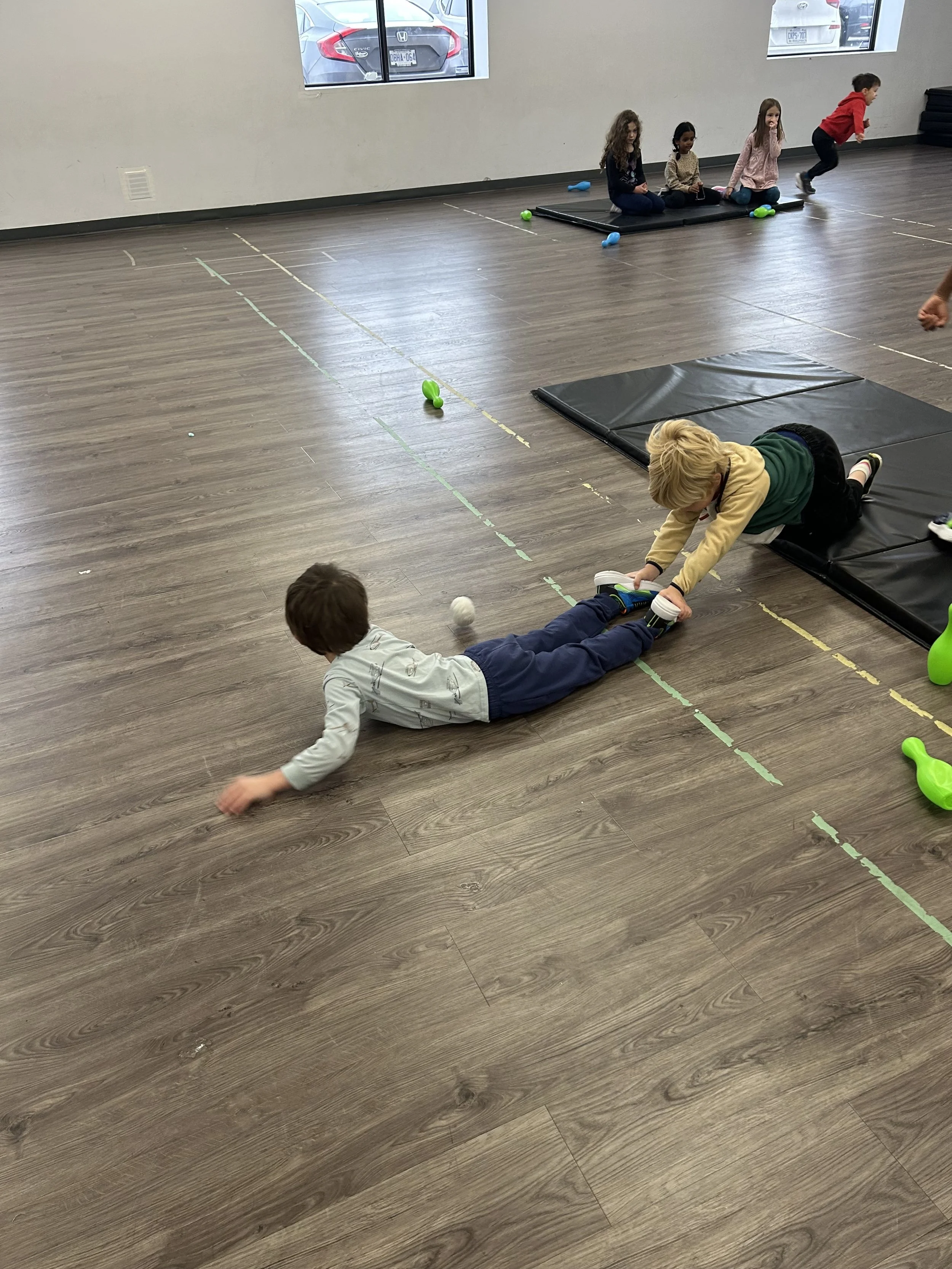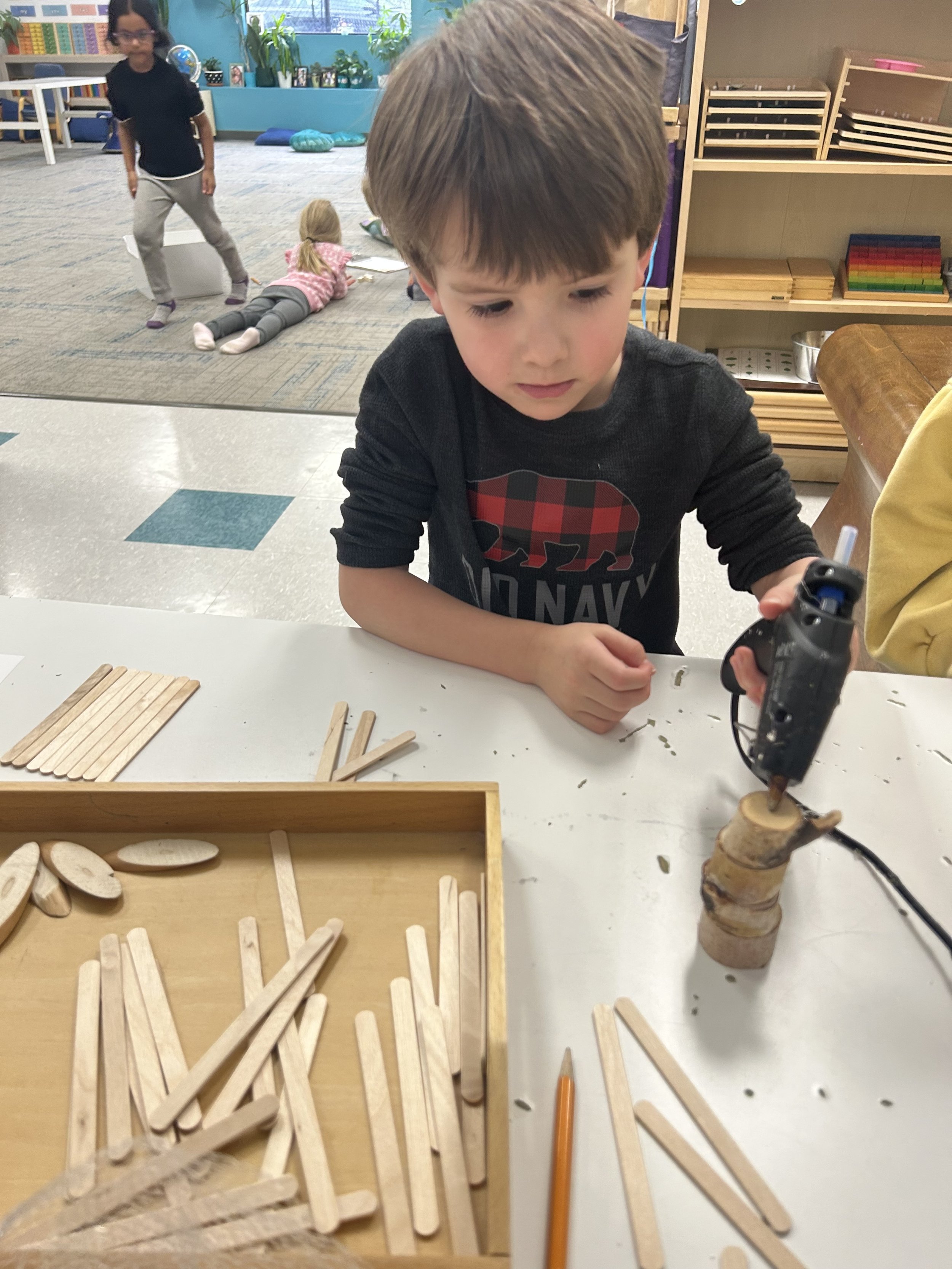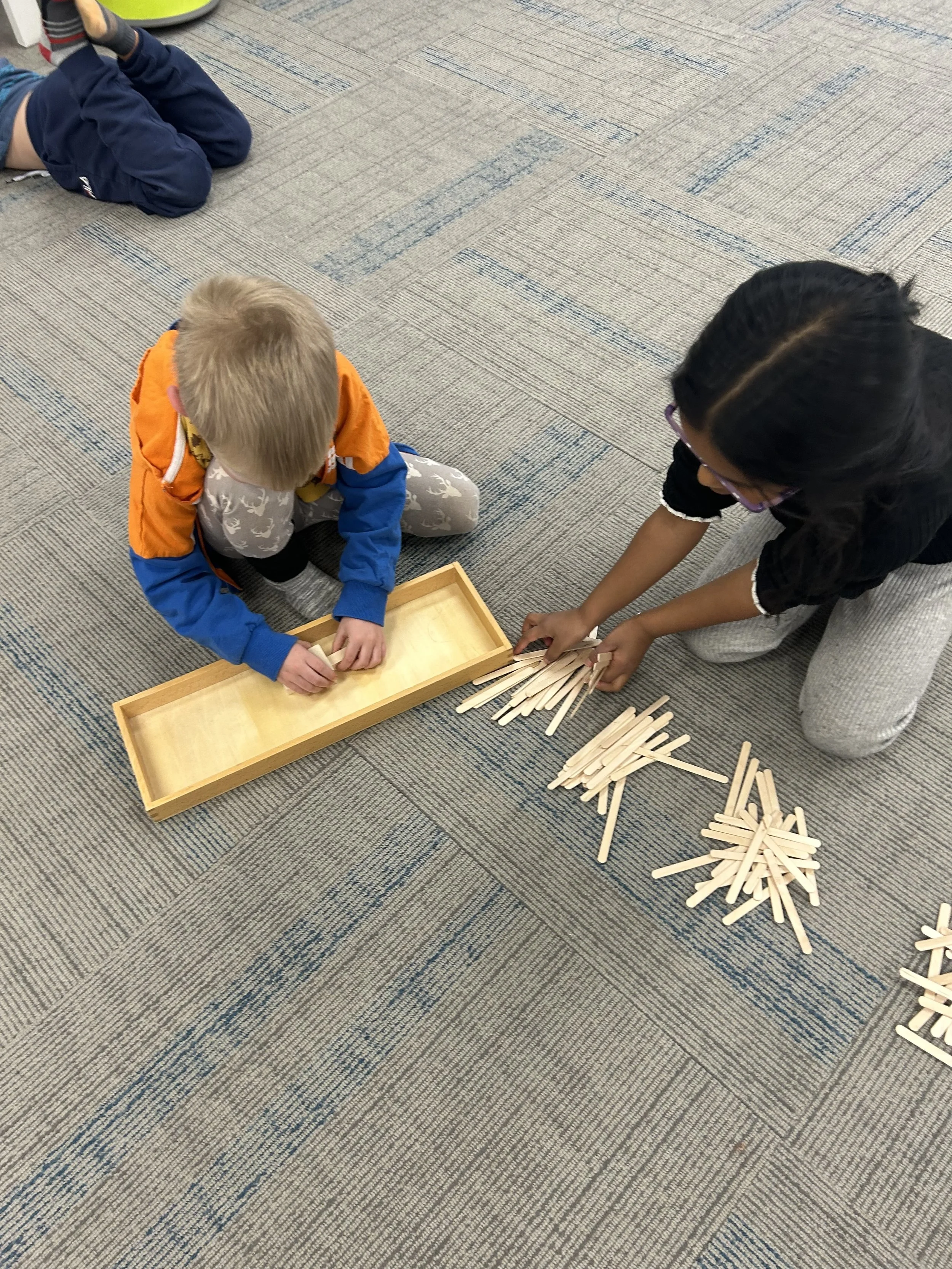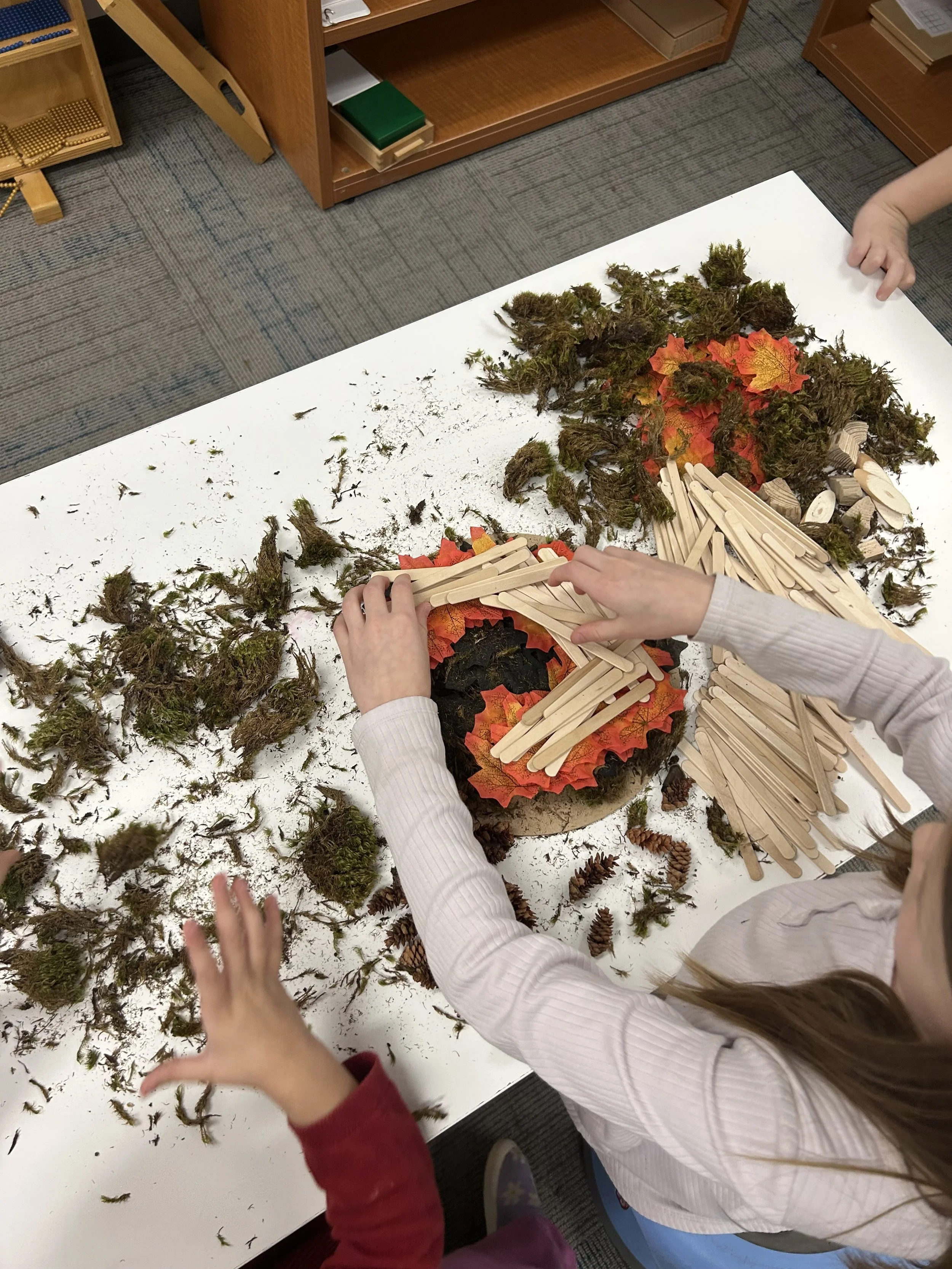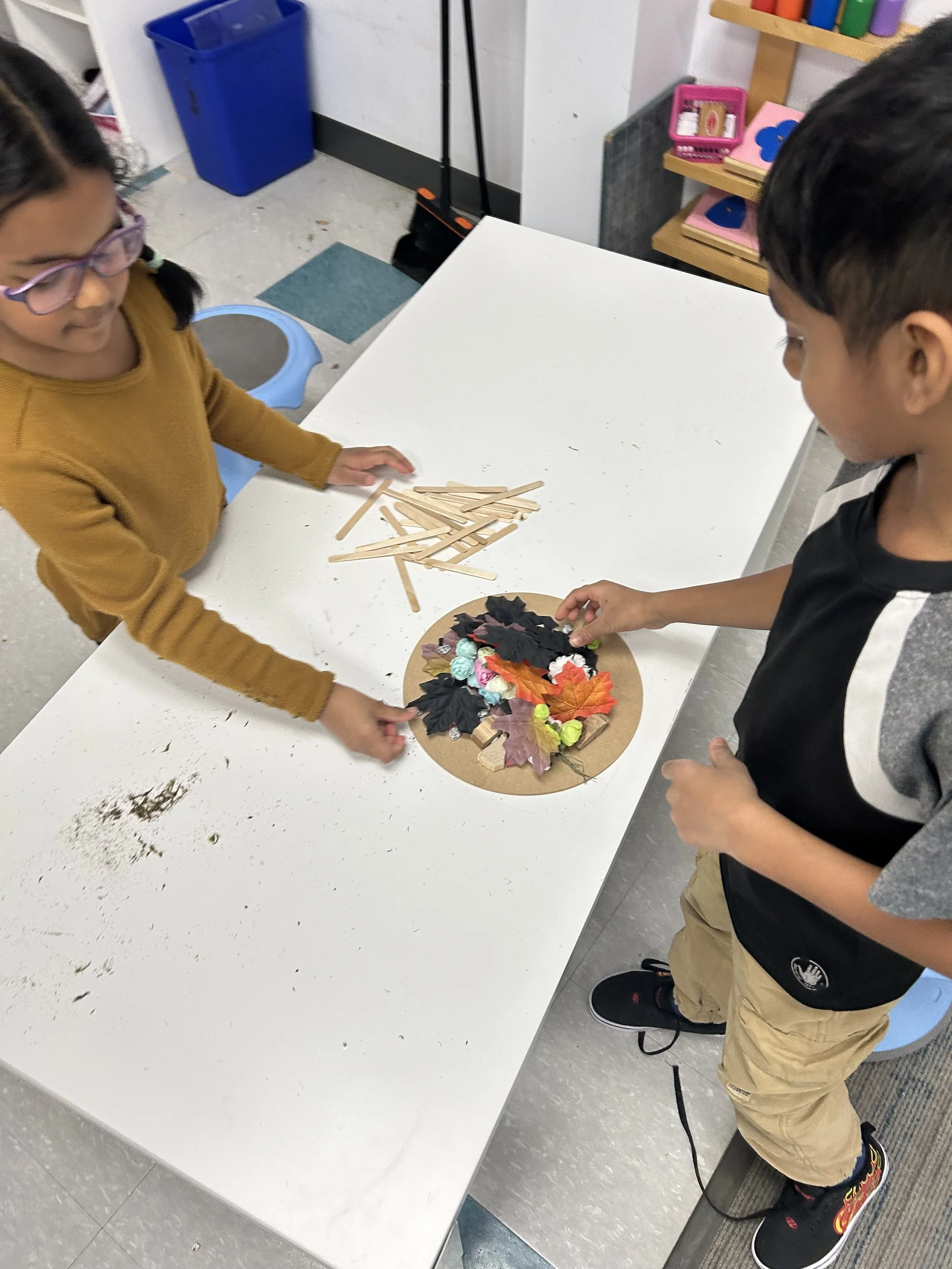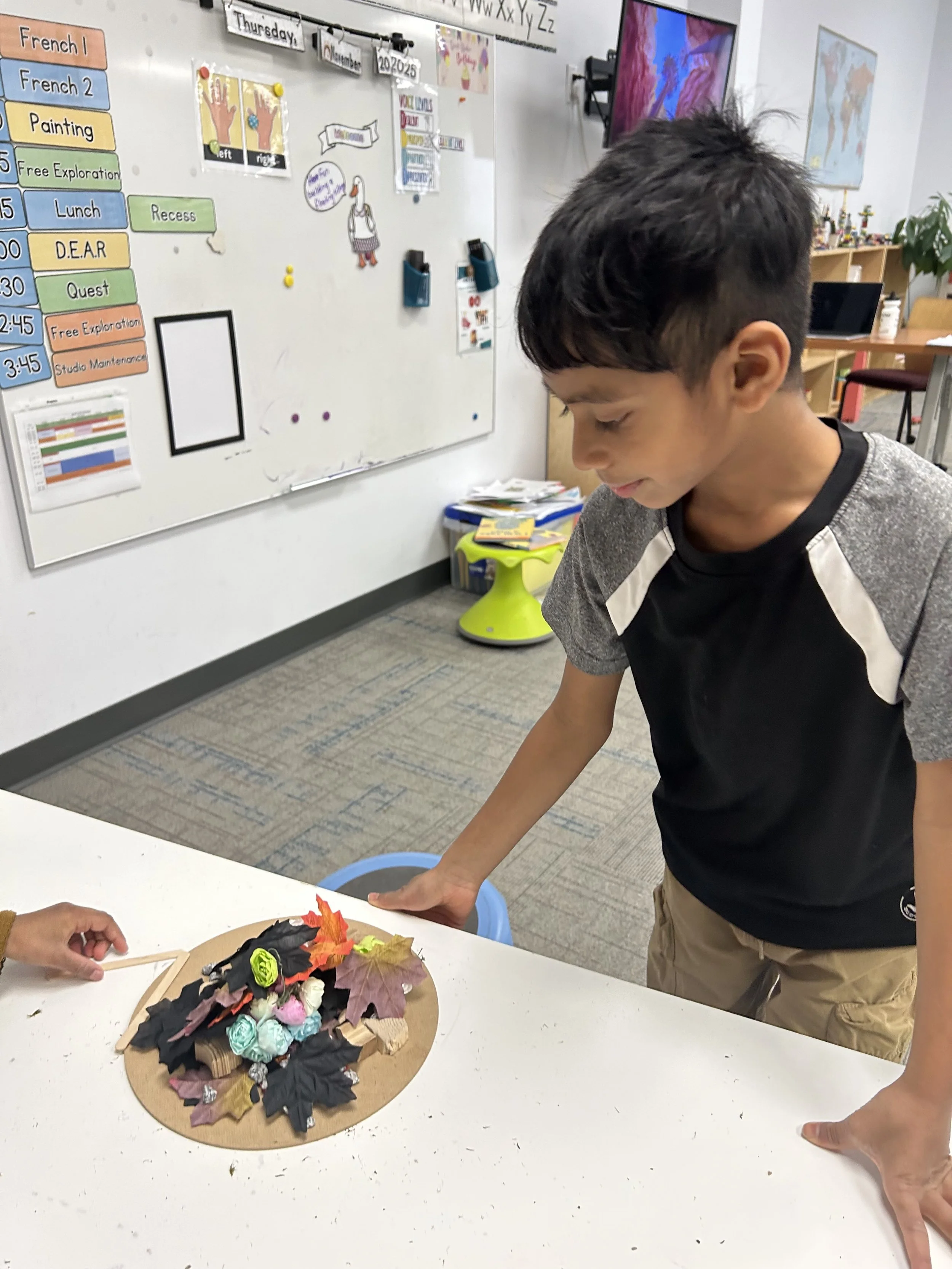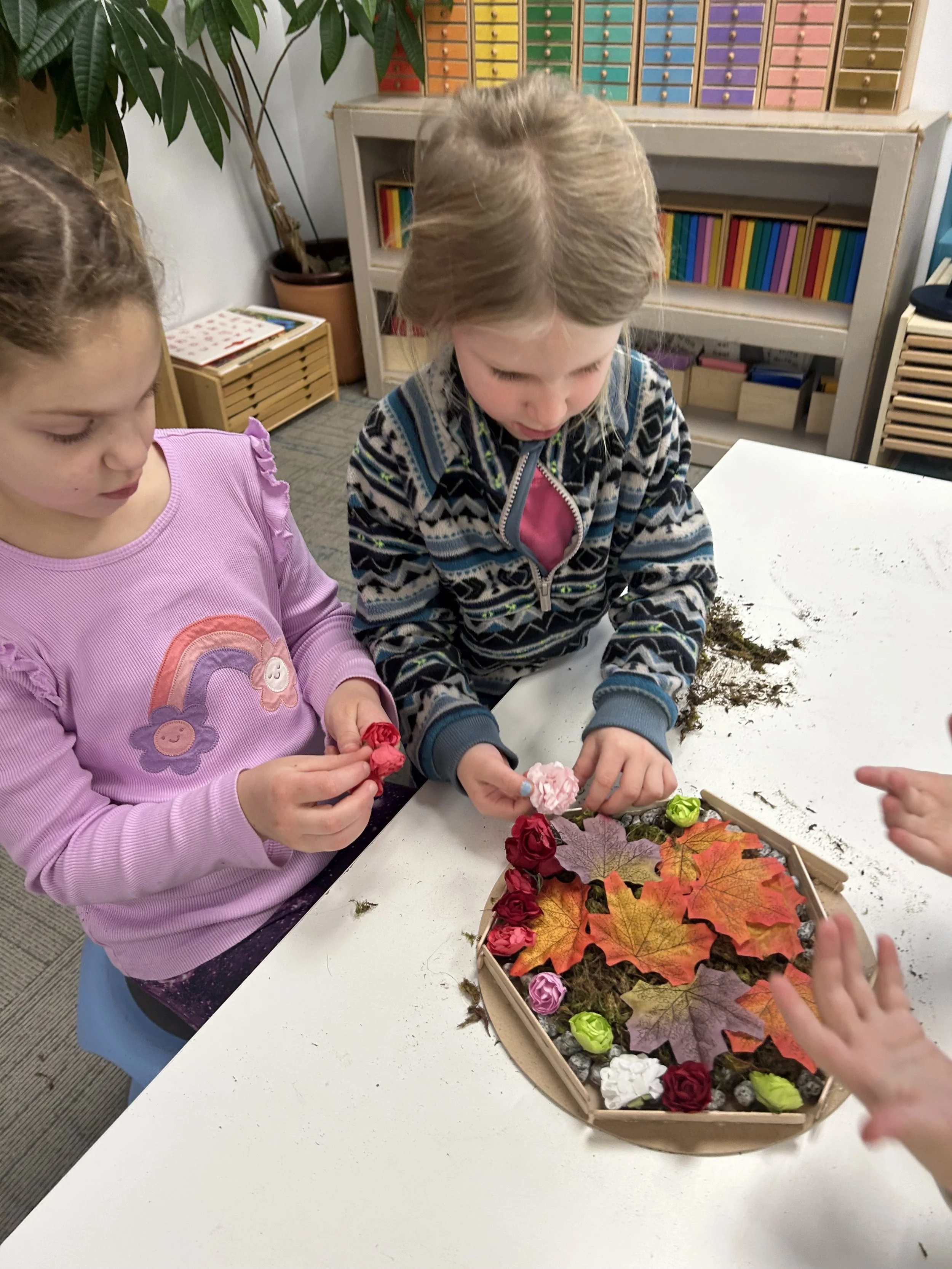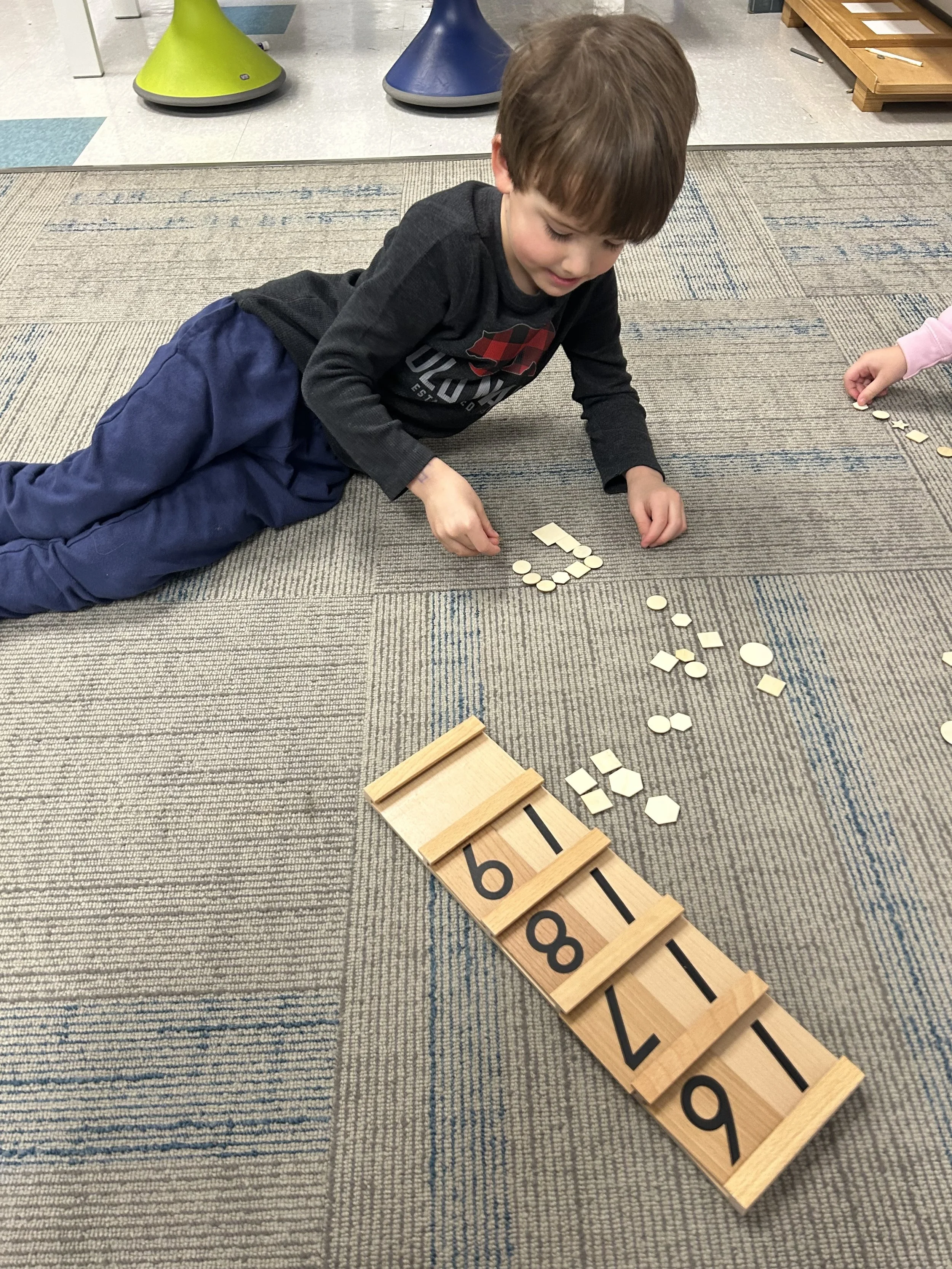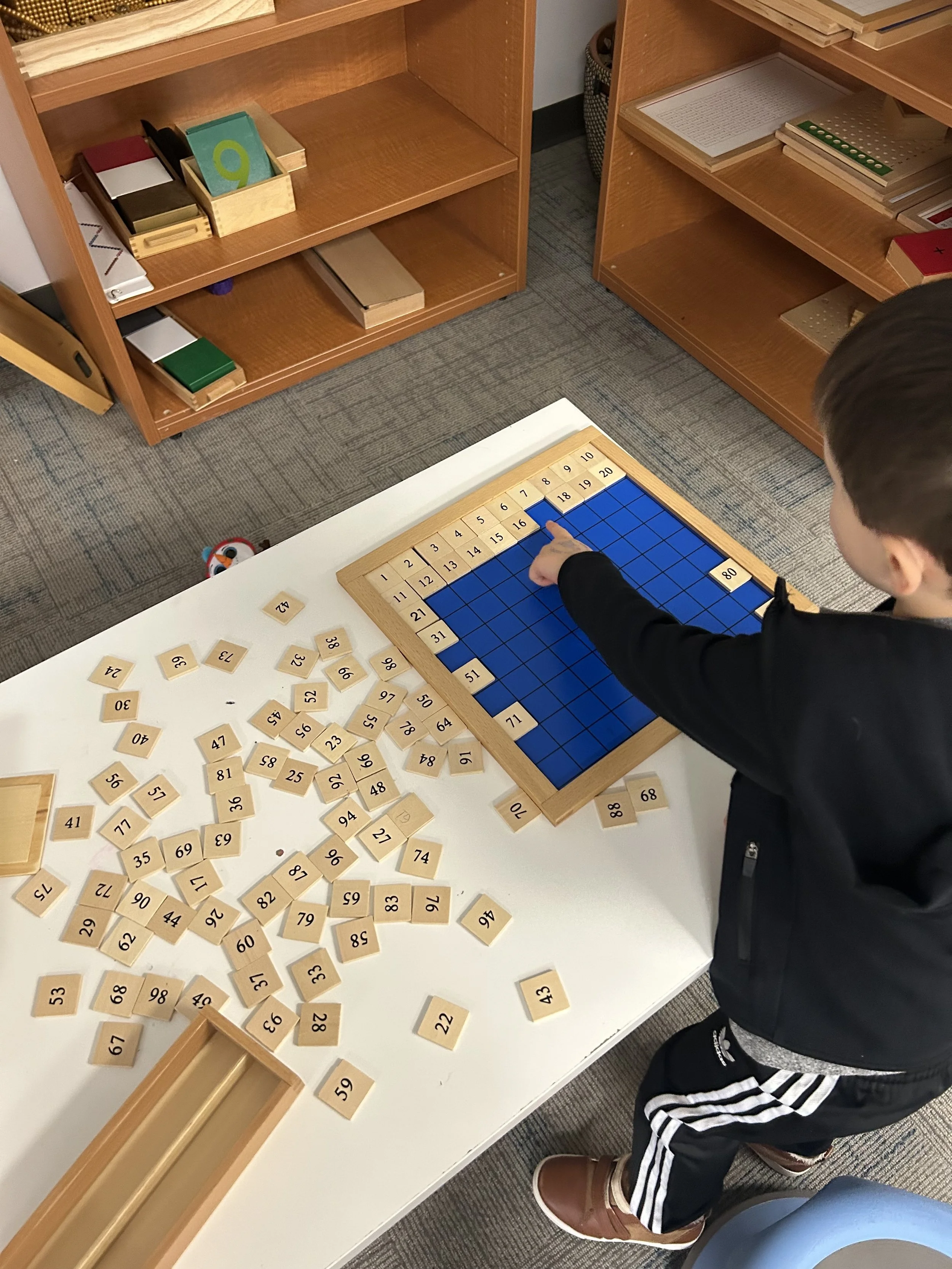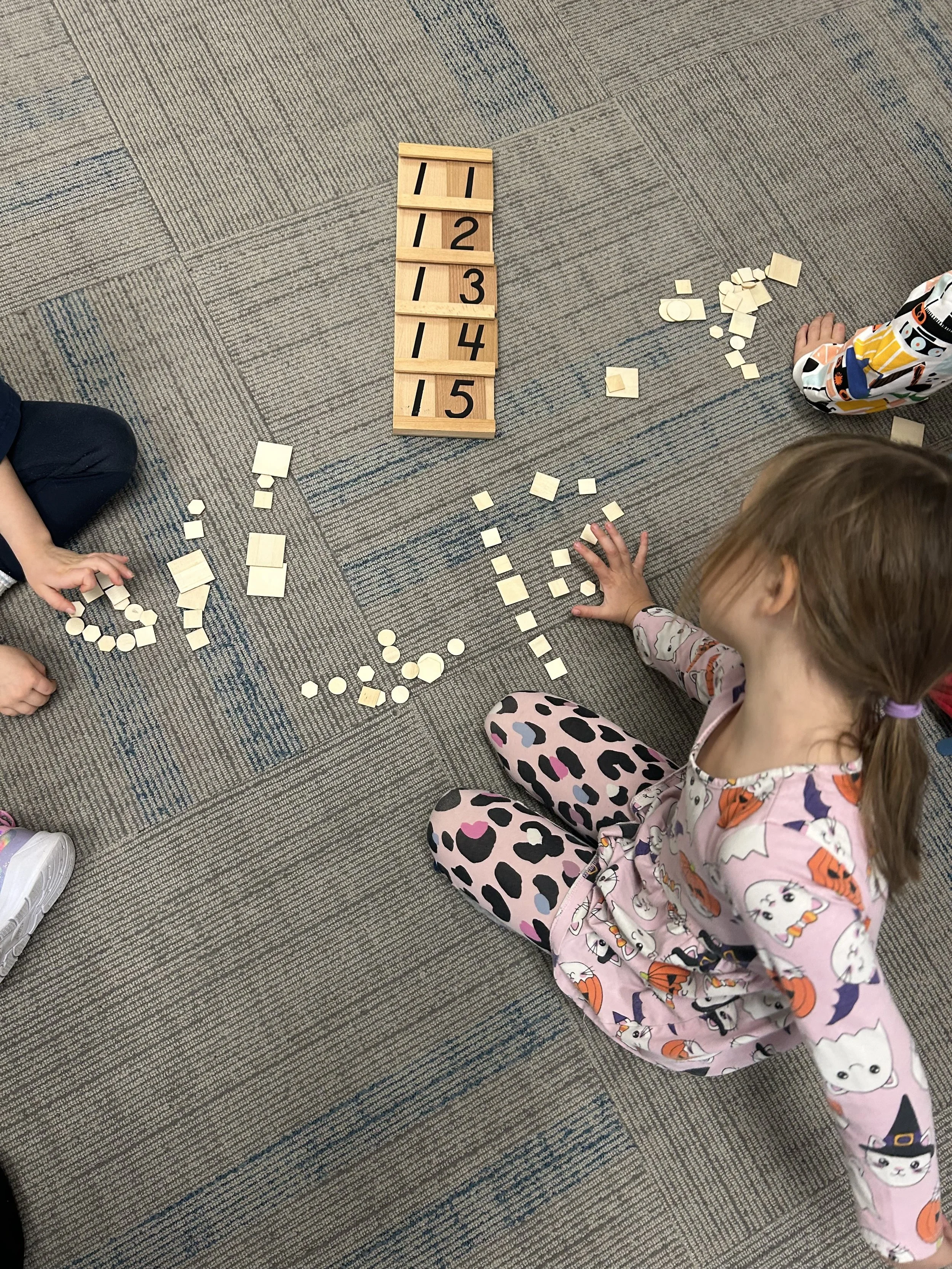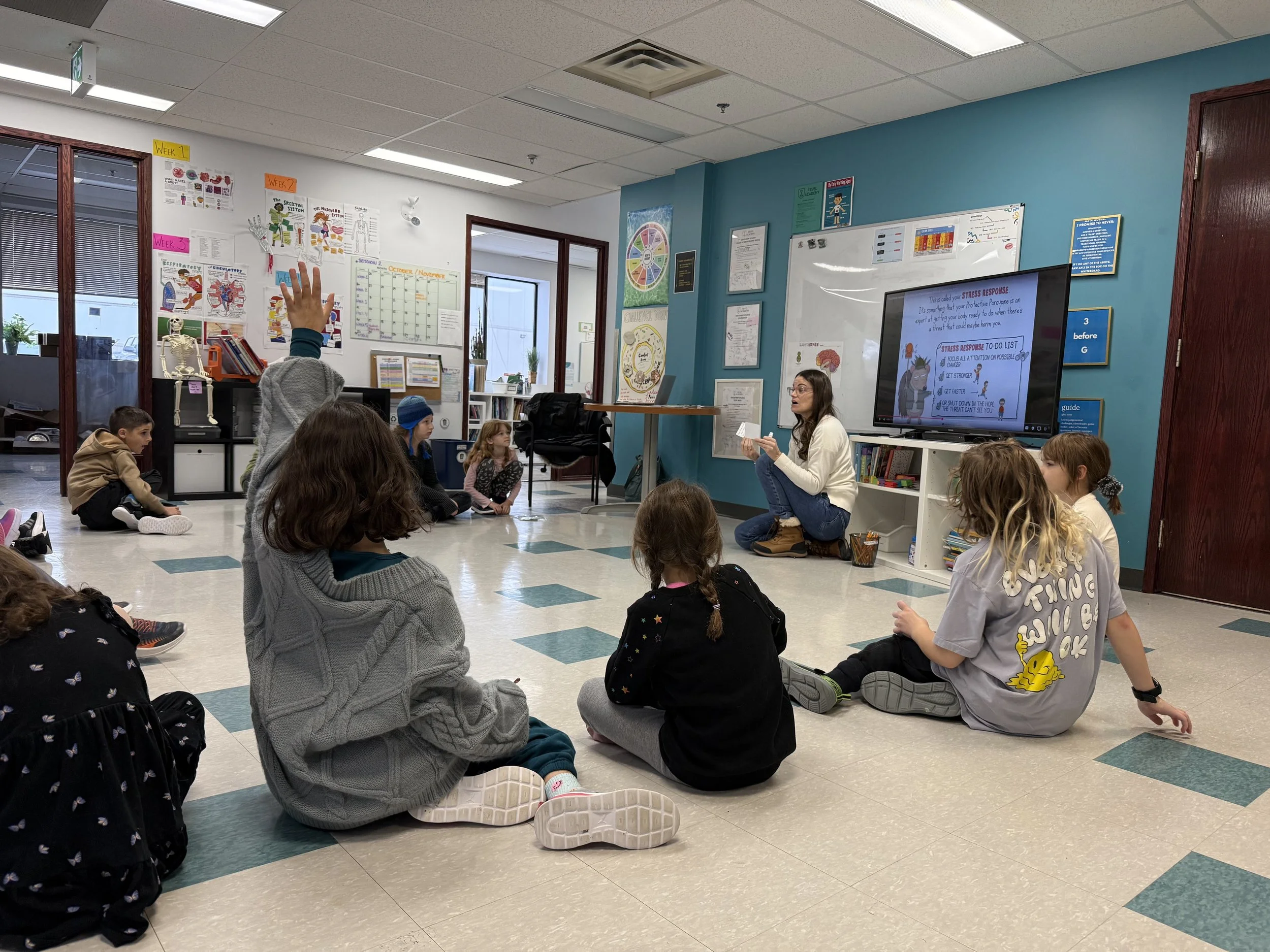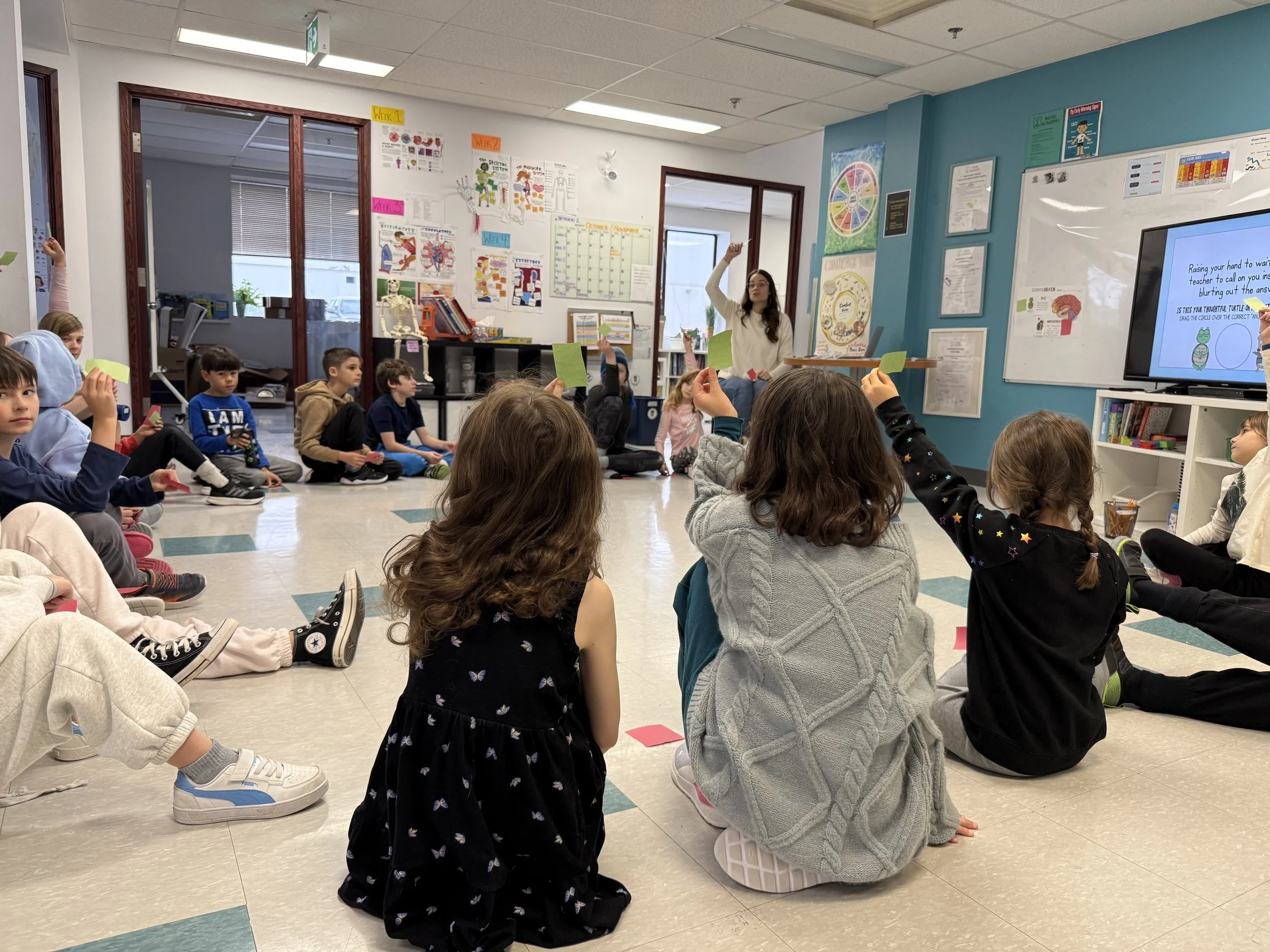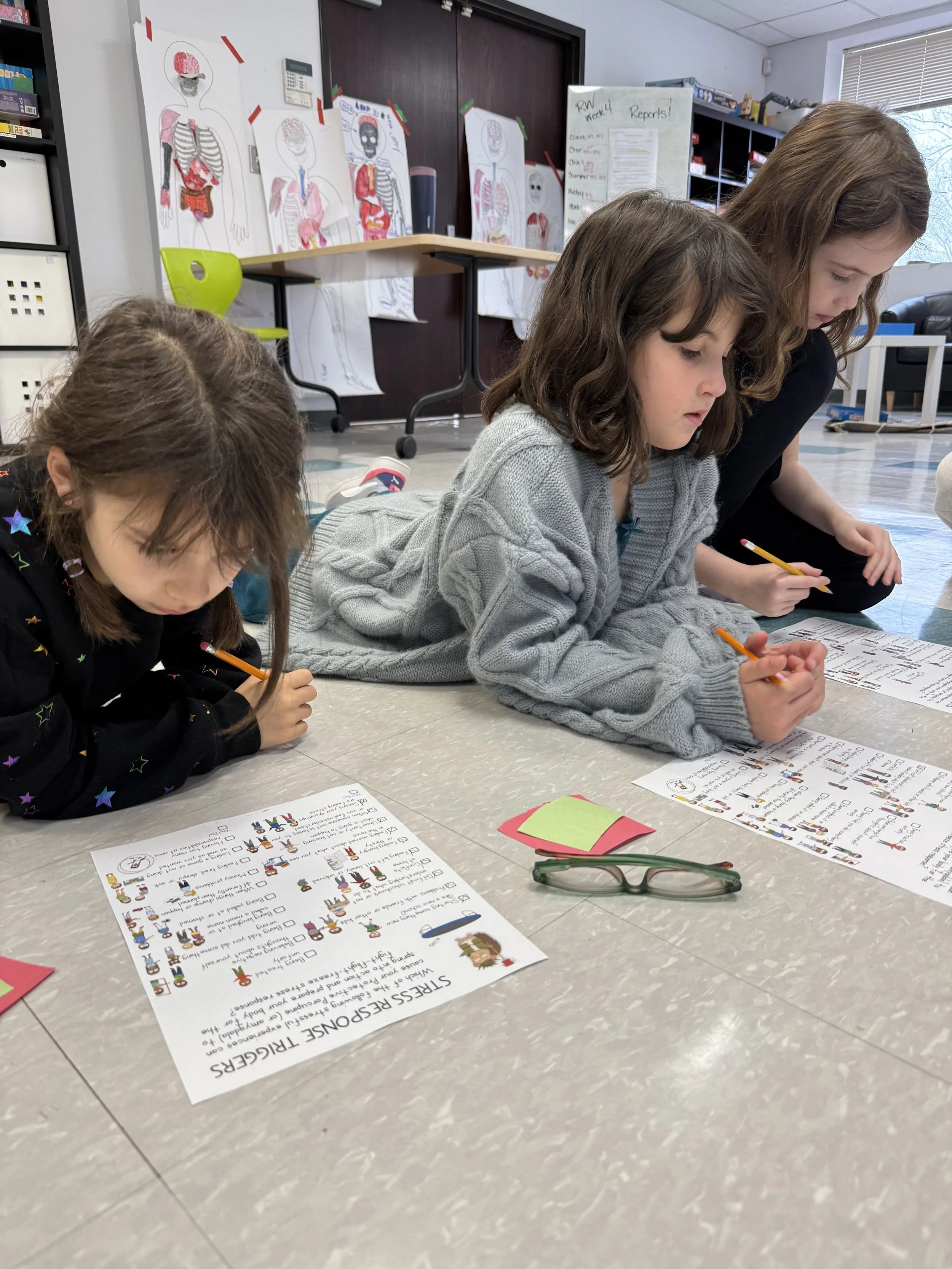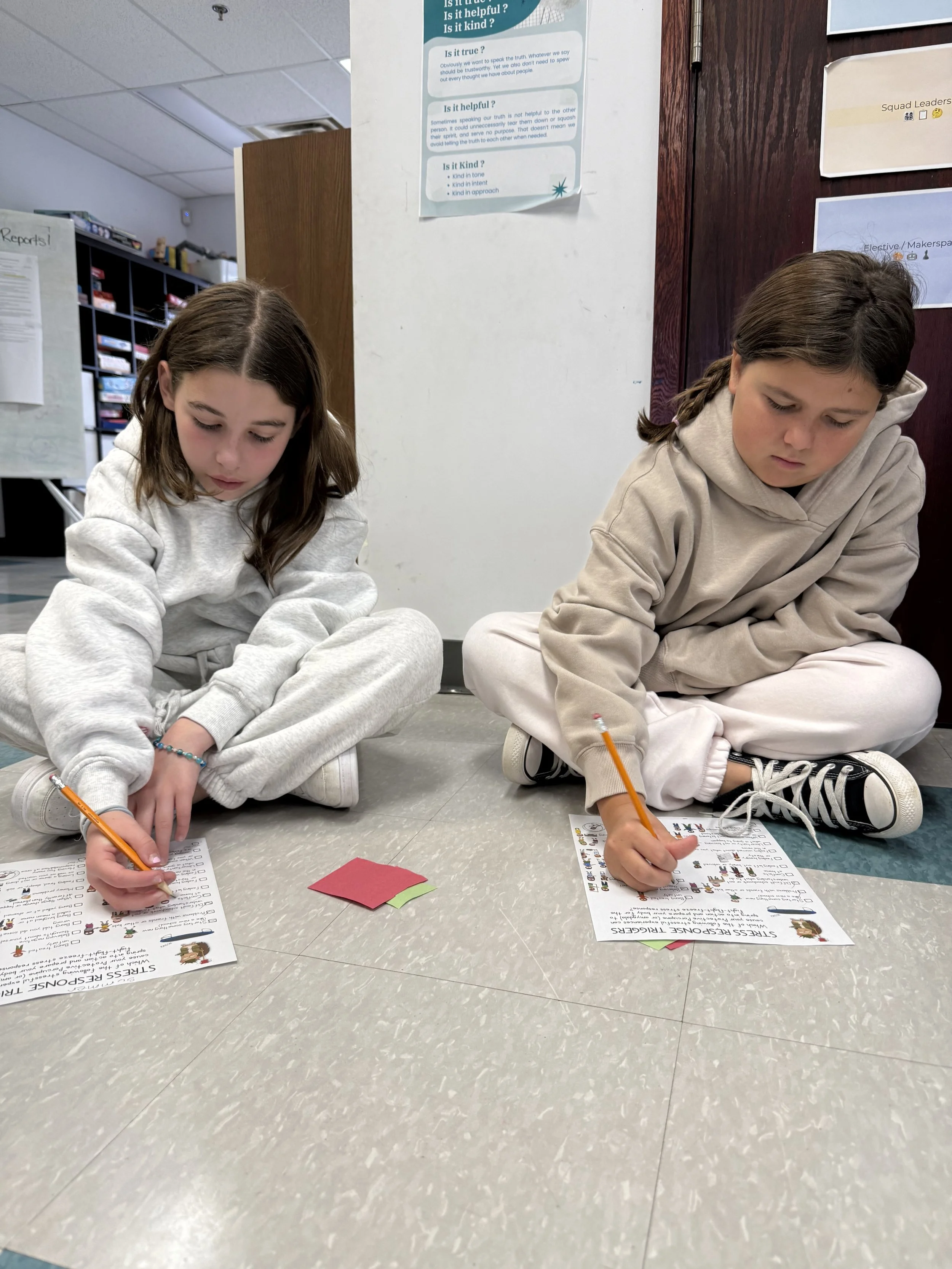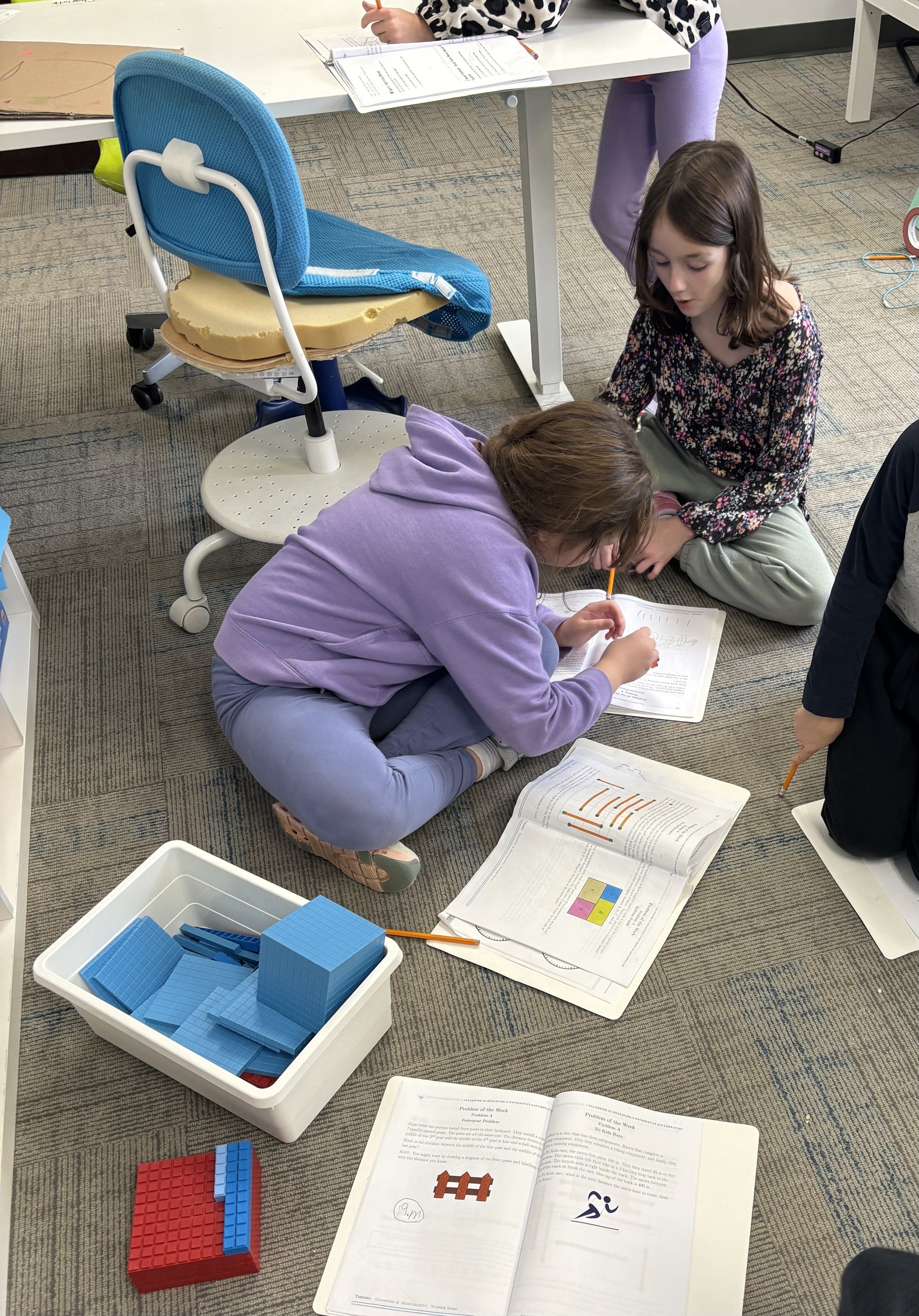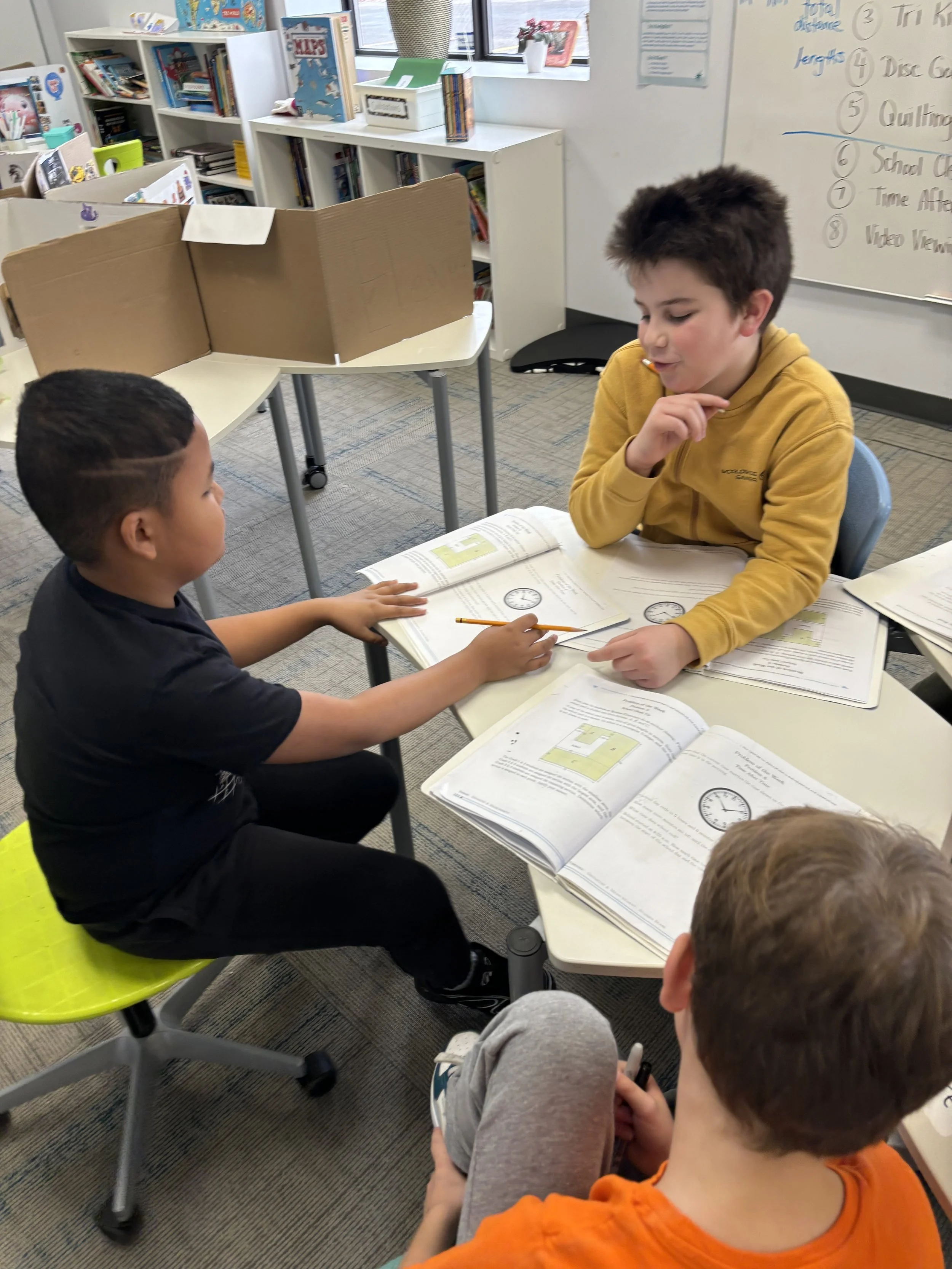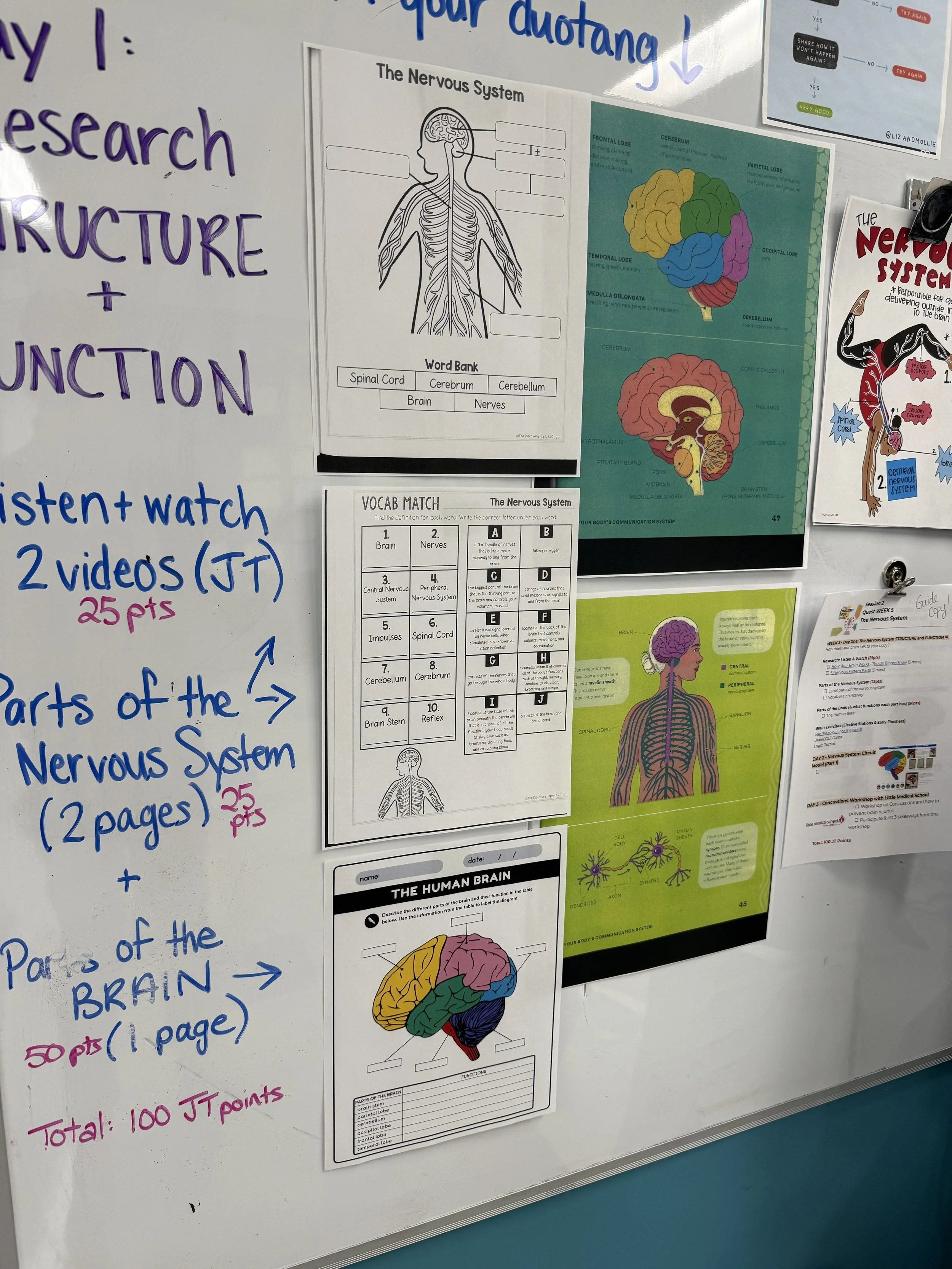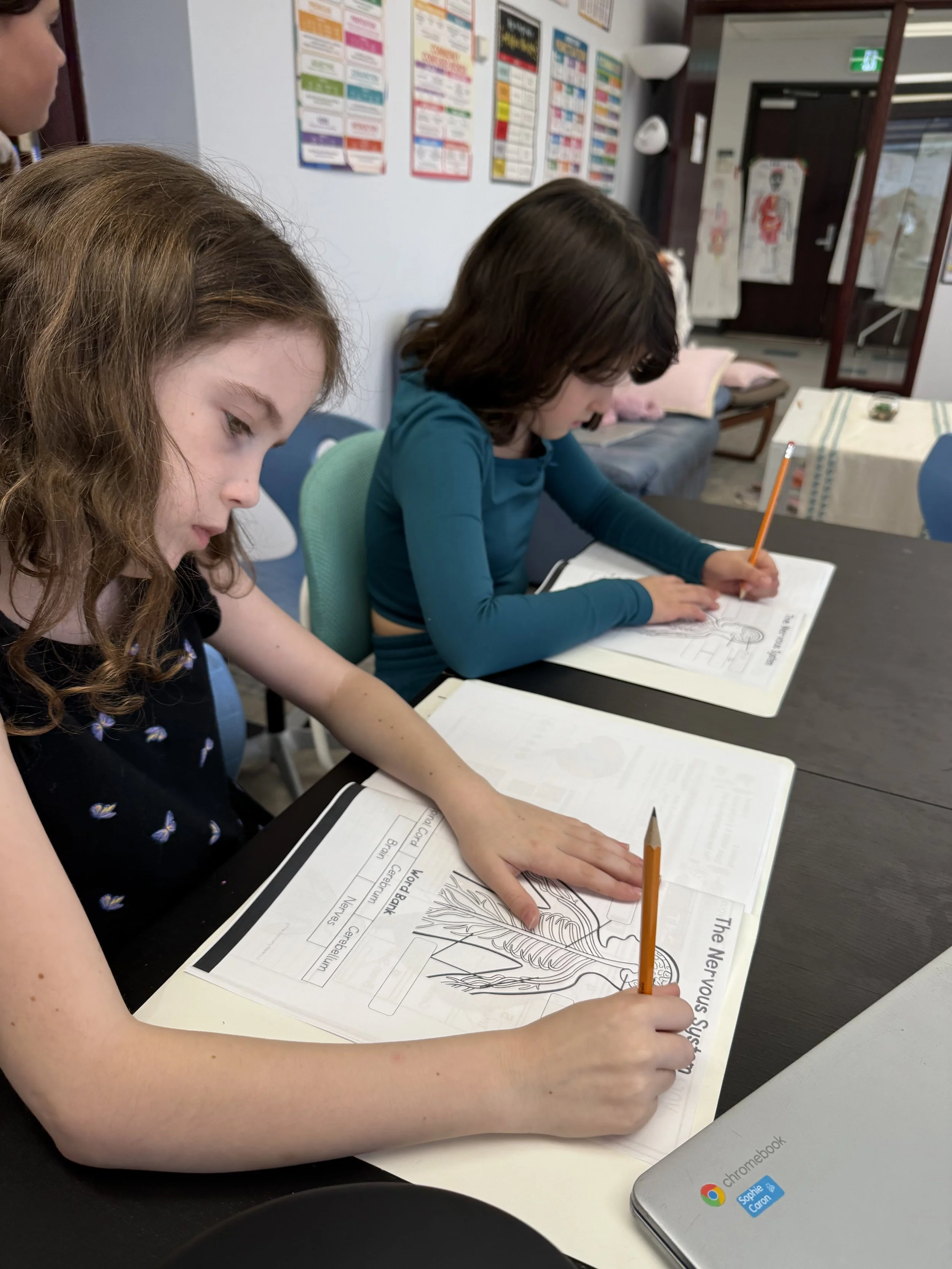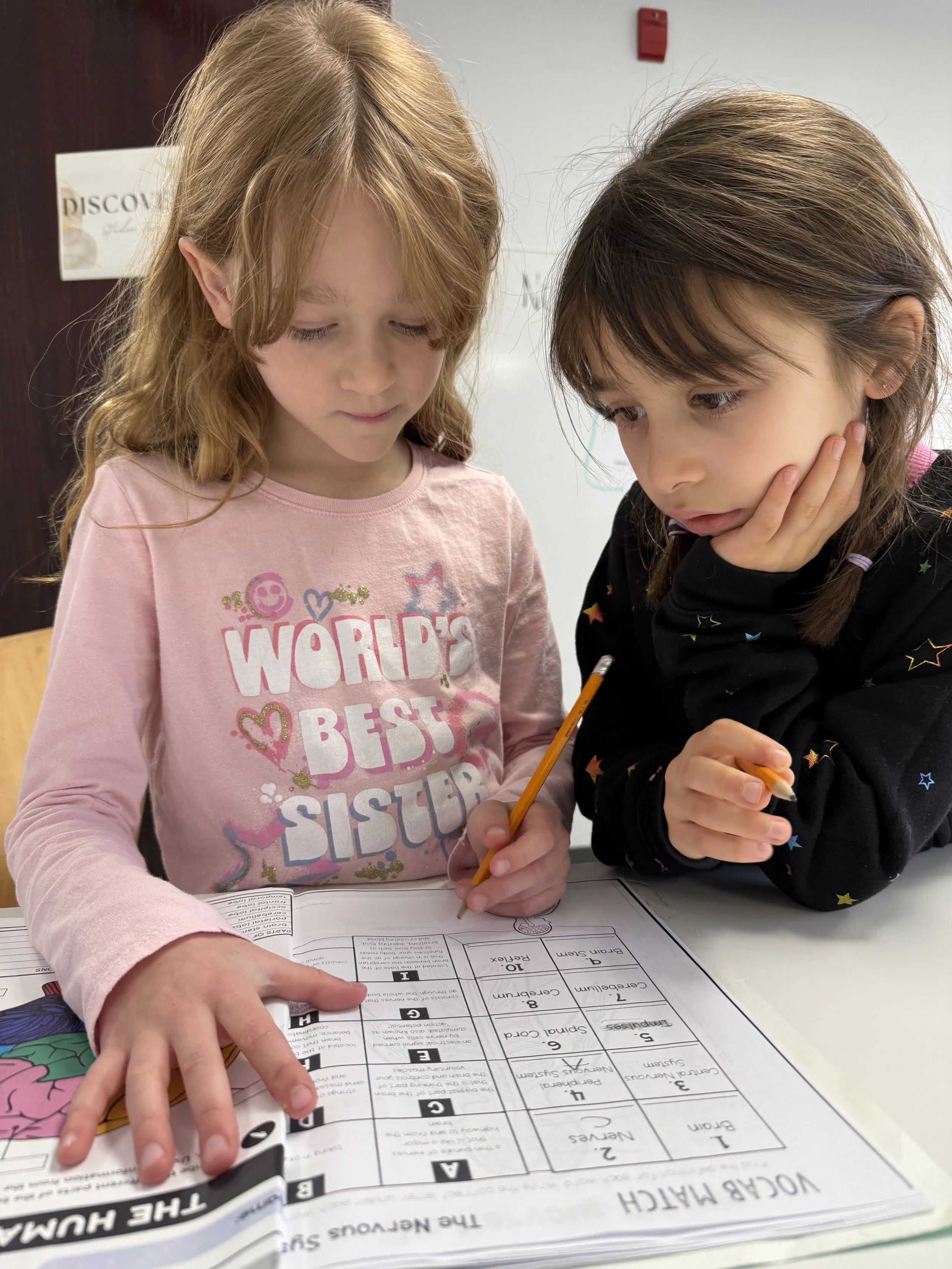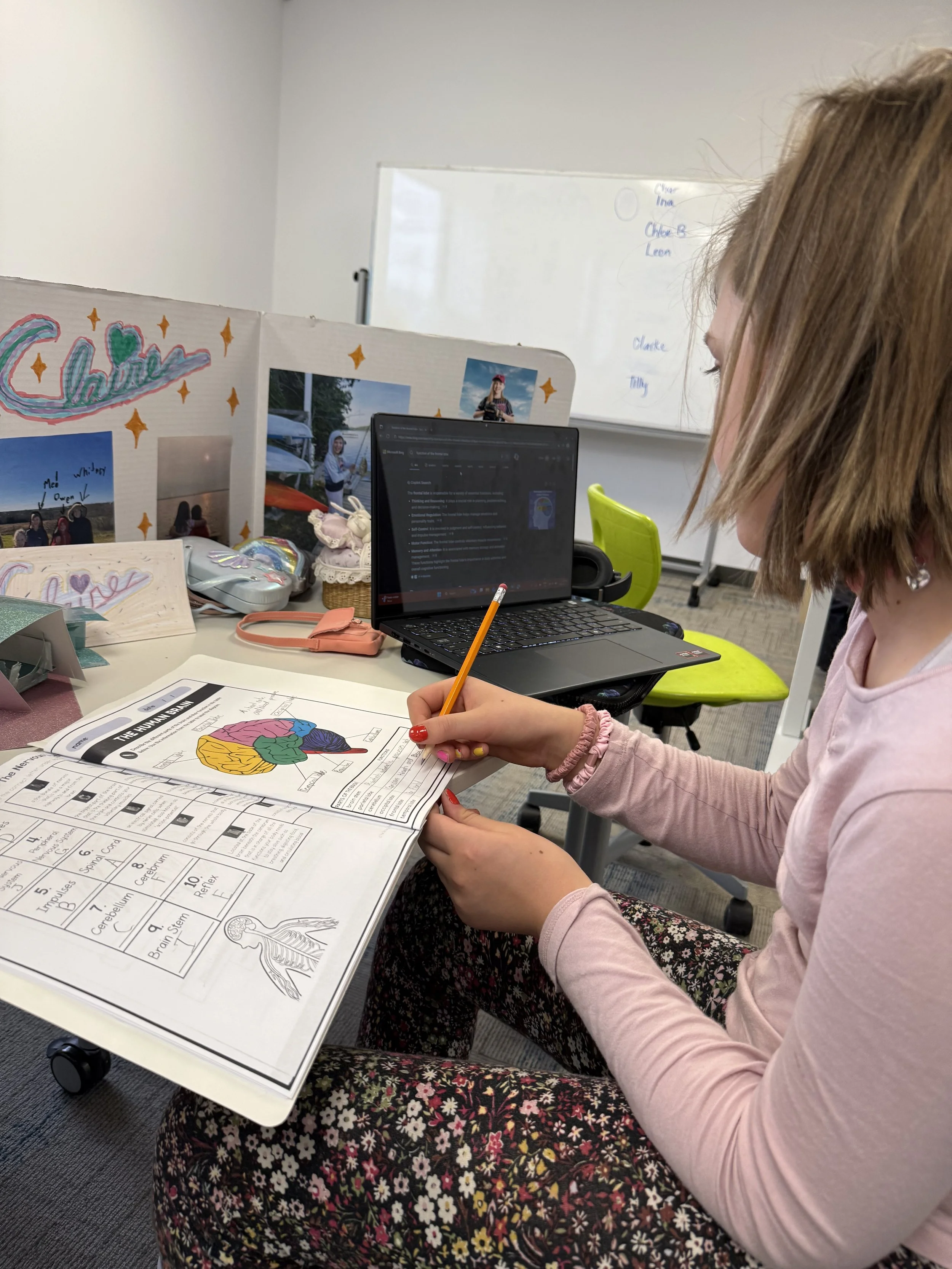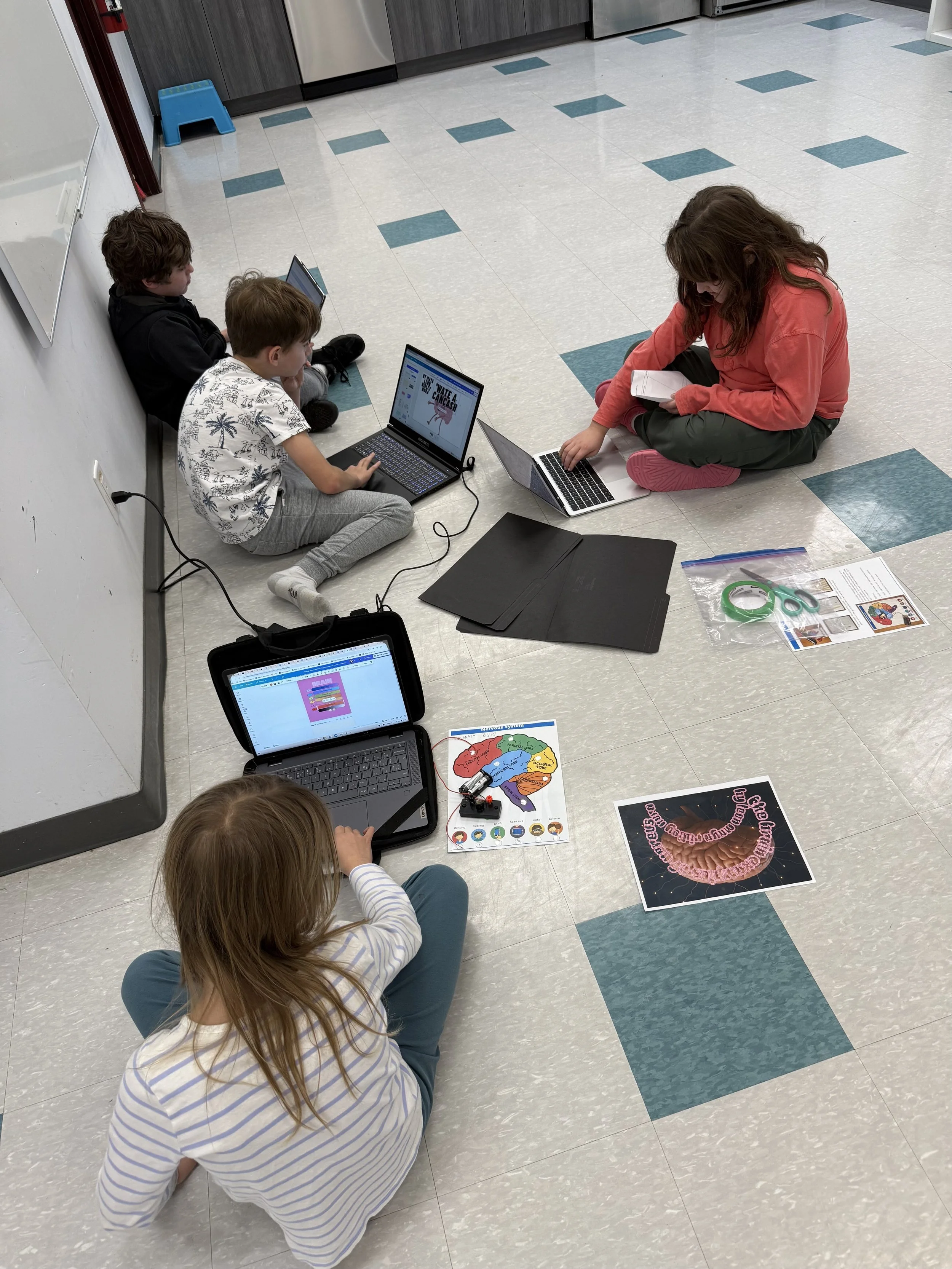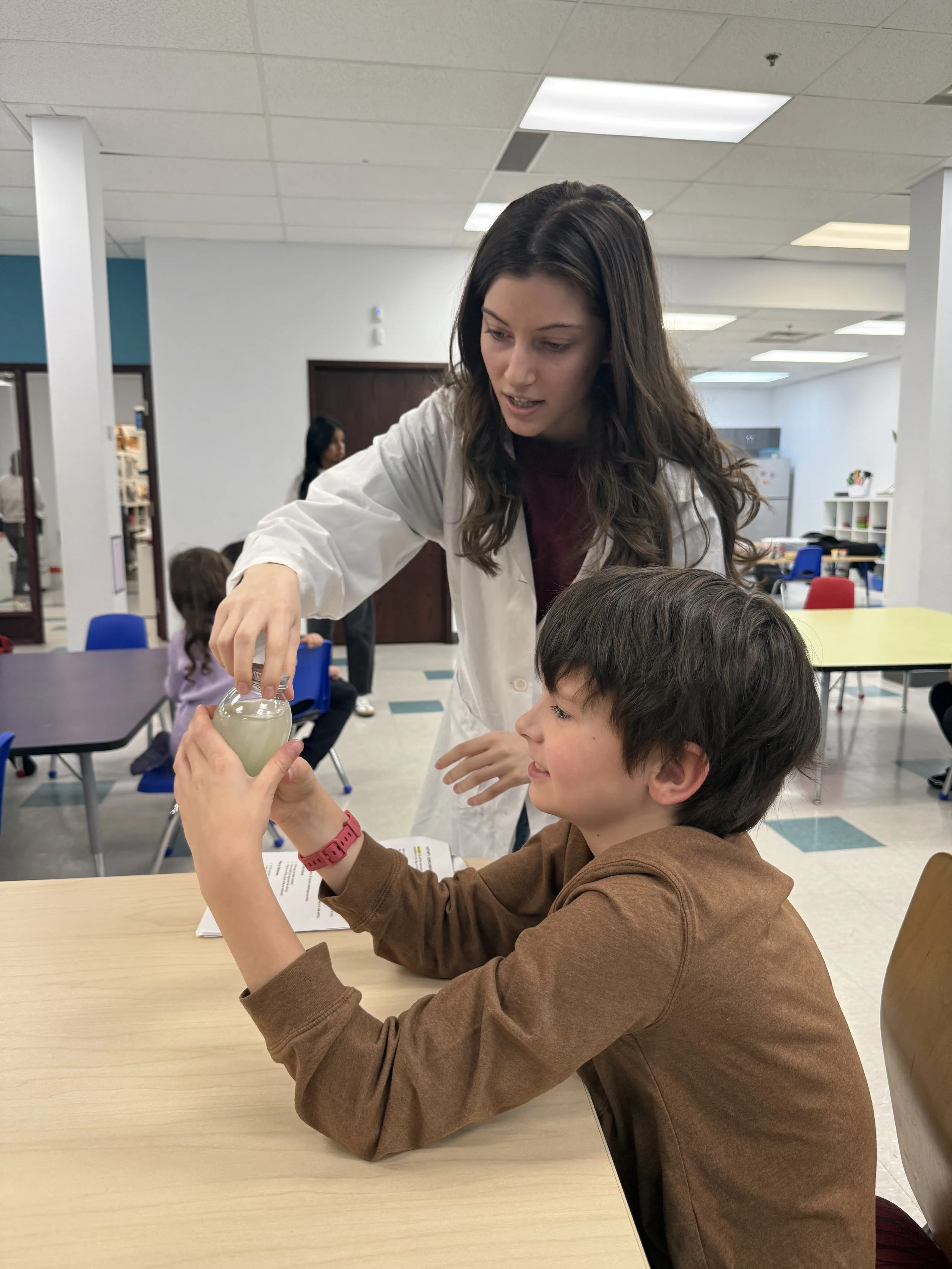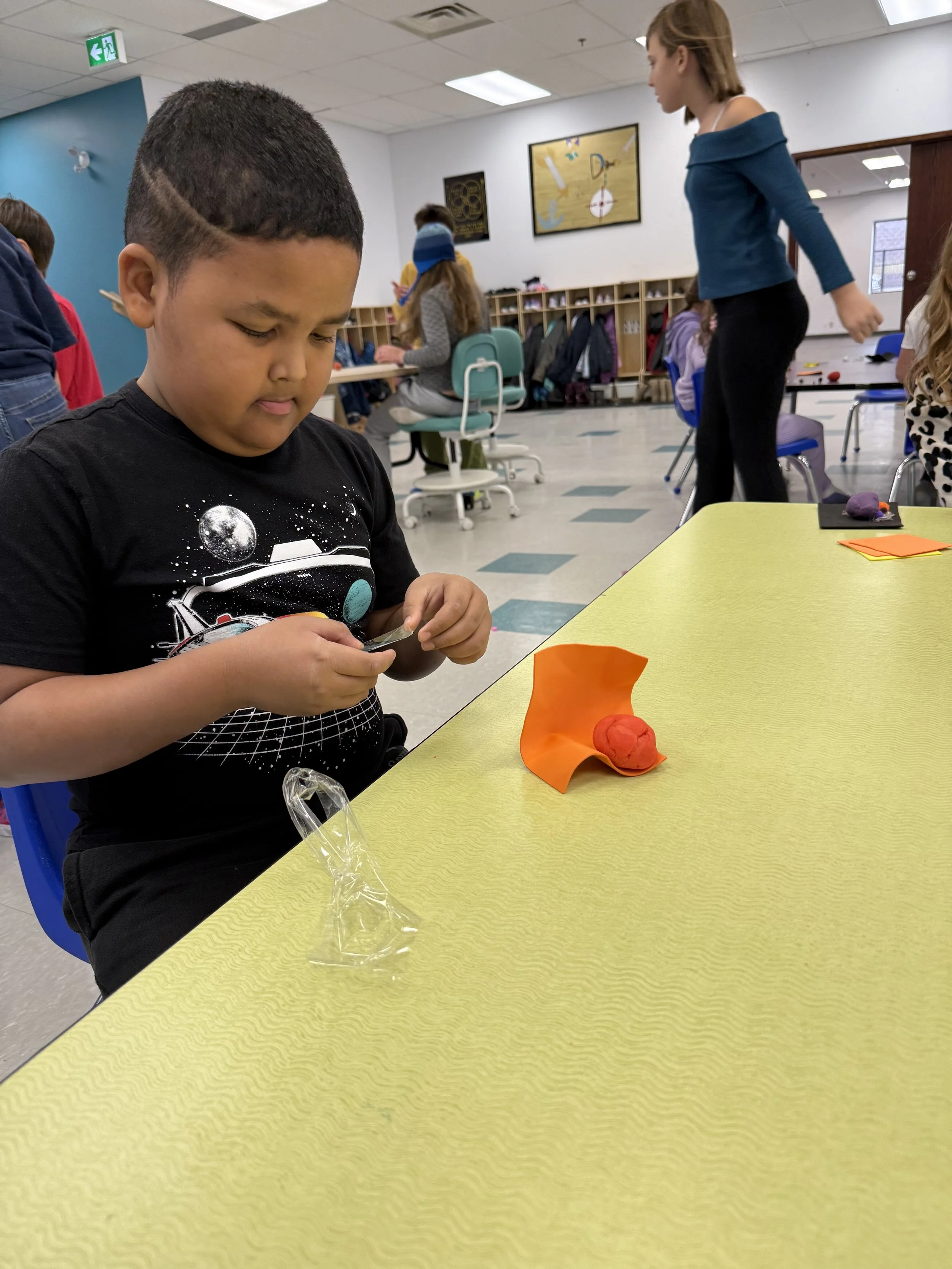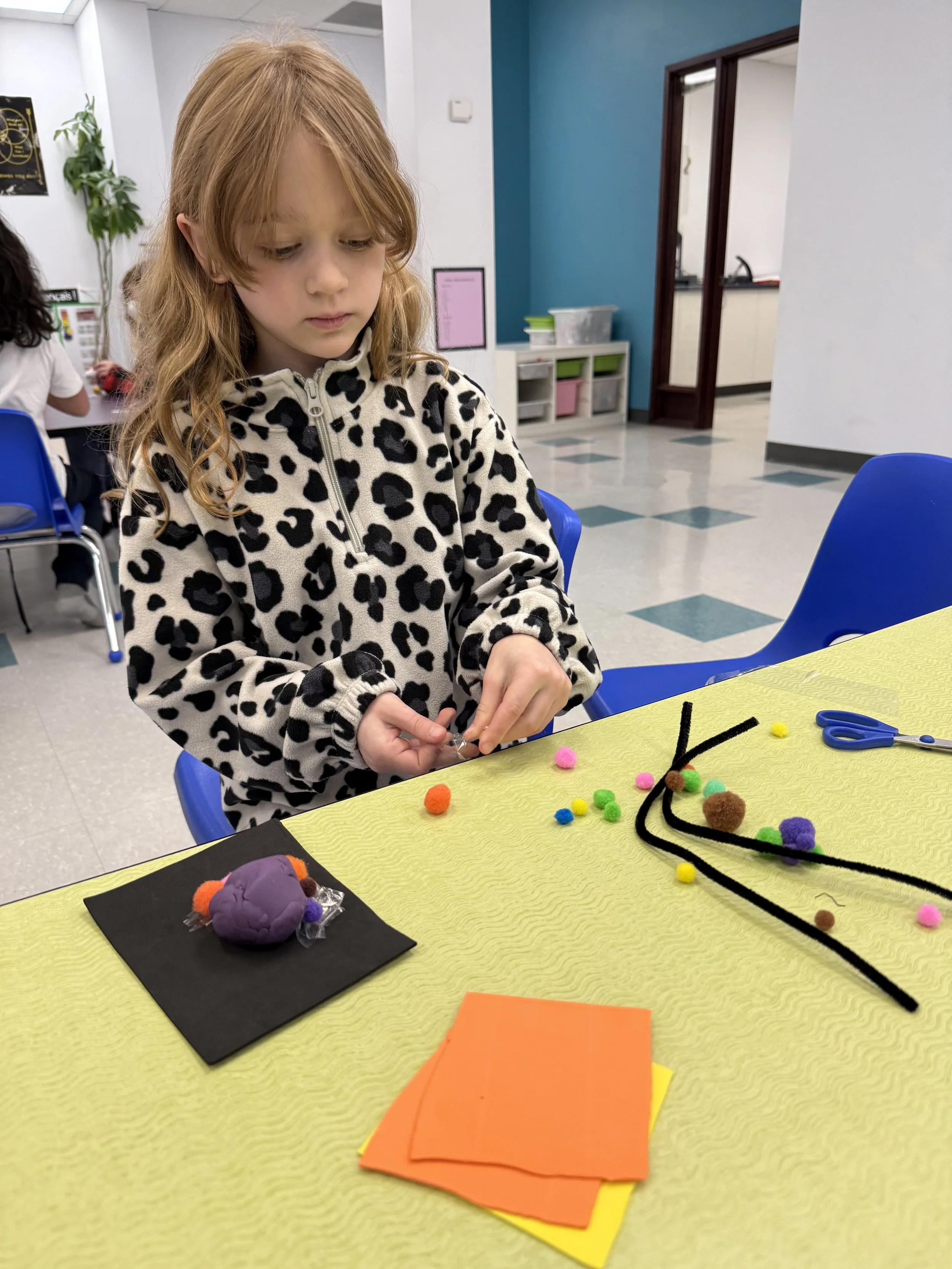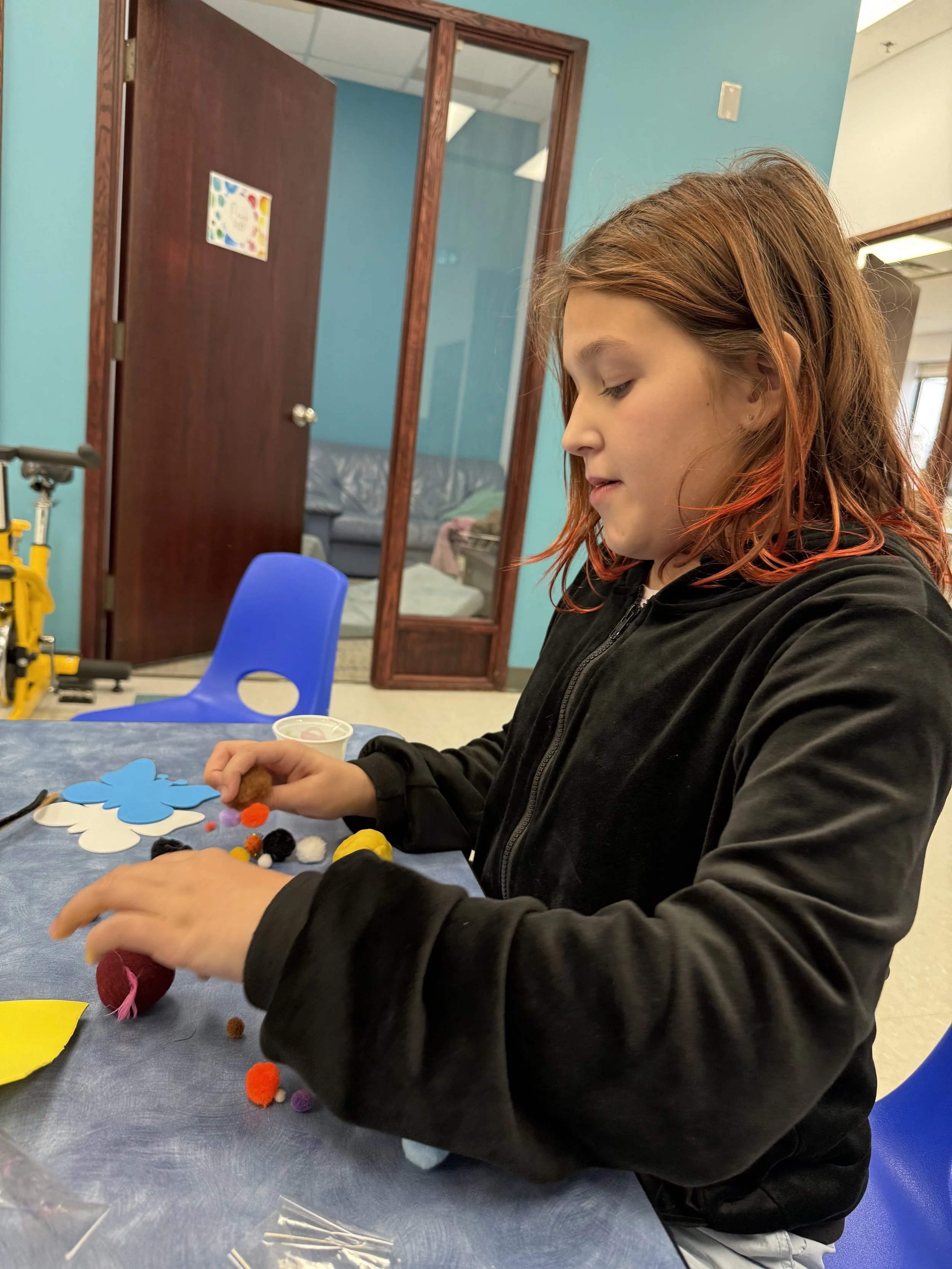Revel Recap: Nov 17-21
Important Upcoming Dates
Collecting Donations for the Ottawa Food Bank and Toy Mountain from November 10th-December 12th, 2025
Session 2 Exhibitions
Exploration Studio: Monday, November 24th at 4:15 pm
Discovery Studio: Tuesday, November 25th at 4:15 pm
Spark Studio: Wednesday, November 26th at 4:15 pm
Registration for the Detective Camp on November 27–28 is open. Please confirm your learner’s attendance and send the payment (100$/2 days) to erin@revelacademy.ca by November 24.
Spark Studio
Mindfulness and Launch
Not every week begins with a calm morning and that’s okay! This week we began with something just as important, morning movement. In the gym, the Sparks played a game of Sink the Ship, where three teams worked together to knock over each other’s pins using “snowballs”. With lots of fast pace movements and team work, it was a great way to set the tone for the week! On Tuesday, the learners focused on a directed drawing of a log cabin. By following step by step instructions, they created detailed cabins, which will be posted at the Sparks’ Exhibition next week. On Wednesday, we had a learner-led yoga session! These Rebels guided the sparks through a mix of solo and partner poses! On Thursday, we used the gym again to get our minds and bodies energized for the day. This time they played Hungry Hippo, working in teams the learners collected as many items as possible and then added up their totals. They had three big rounds of fun! To wrap up our week, the studio spent time reflecting in their gratitude journals with a writing prompt about one of their favourite memories from a place they’ve visited. Learners shared places such as Great Wolf Lodge, The Big Ben, Ripley’s Aquarium and Japan. They also listened to Thankful by the Juicebox Jukebox.
Quest
This week in STEM, the Sparks explored natural structures. For the first three days, they focused on creating their own floating village. To begin, they learned about real floating villages around the world. Some learners and Guides shared personal experiences of visiting floating villages in Cambodia. The Sparks explored a variety of photos from floating villages, discussed what they noticed, and asked many thoughtful questions, such as, “Where do families use the bathroom?”, “How can they get food?” and “Where they do their laundry?” These questions led to an intentional and lively conversation. As the Sparks are stepping into the roles of engineers this session, the Sparks then created blueprints for a structure they wanted to add to a floating village. In small groups, they designed their structures using popsicle sticks, wooden stumps, cubed wooden blocks, rectangular wooden logs and rocks. They also had access to hot glue to attach their designs. Rebels spent two full Quest blocks completing this challenge. They each placed their structures on the floating village table, which will be presented at their Exhibition next week! Over the second half of the week, the Sparks shifted their focus to building bird nests. With limited natural materials, pinecones, real and artificial leaves, moss, and logs. Each group was given a unique bird scenario and challenged to design a nest that met their bird’s specific needs.
Art
For this week’s workshop, the Sparks designed nature themed paintings. Using a mix of watercolours, pencils, dried leaves, sand and small rocks, they created a sunset scene with dirt trails. After painting their sunset and outlining their designs with a black pastel, they added sand and rocks to give their artwork texture and details!
Reader/Writer Workshops
Group One continued with phonics this week, focusing on the letter K. They listened to a catchy song, came up with a list of words and practiced printing the letter K. Additionally, Sparks from this group worked on the Waseca red reading drawer and practiced reading the first set of Bob Books. Lastly, they used the story telling cards to write another story using their imagination. Group Two learners focused on the digraph CK. We worked through our Waseca booklet and explored a variety of words that include the ck sound, such as lick, duck, truck, clock, pick, snack, black, and stick. Each learner selected three of these words to sound out and write independently. We also spent time reviewing the digraphs we’ve learned throughout the session. Together, we practiced saying sh, th, ch, and wh three times each, reinforcing the sounds and how they appear in words. Learners then chose three words that use these digraphs and wrote them on their own, practicing both phonics and spelling. To finish our lesson, everyone worked on a digraph review word search, which provided a fun and engaging way to apply their growing phonics knowledge. We are proud of their hard work and progress! Please feel free to practice these digraphs at home by looking for ck, sh, th, ch, and wh words in books, signs, or during daily activities.
In the studio wide reader-writer workshop, they completed their book study, How to Catch a Witch. This week they shared story clues, brainstorming creatures that the witch brought along and to end, they got the opportunity to design their own book cover for the story, as if they were the illustrator!
Math Workshops
Group One was divided into micro-groups. Some learners practiced addition and writing their numbers, while another group worked with the 100 board, with others continuing to learn numbers 1 through 20, using loose parts and whiteboards to build and represent each number. Throughout the week, many learners in Group One also chose to work with our wooden number cards, which supported their number recognition and understanding. Next session, we will branch our studies into learning about 2D and 3D shapes! Group two continued their exploration of four-digit subtraction using the Montessori Stamp Game. They were introduced to Presentation Two, which focuses on dynamic subtraction, which is the process of borrowing when there are not enough units in a particular place value to complete the subtraction. During this presentation, the learners discovered what to do when a smaller quantity must be taken away from a larger place value that does not yet have enough units to complete the subtraction. Using the stamps, they practiced exchanging, also known as borrowing. They would trade one piece from a higher place value for ten pieces of the next lower place value. For example, if they needed to subtract more units than they had in the units column, they learned to exchange one ten for ten units. This concrete, hands-on experience helped the Sparks to visually and physically understand how regrouping works.
French
On Monday both groups reviewed the days of the week by singing “Le roi, la reine et le petit prince.” (The King, the Queen and the little Prince) Le roi la reine et le petit prince - Comptines avec paroles | Carmen Campagne
Up next, the learners played Bingo - Human Body Edition to reinforce their new vocabulary. On Wednesday, the Sparks played La Roue Des Sons (the Sound Wheel) to explore how different letter combinations change the pronunciation of words in French. To wrap up the week, we went over to the gym to play a game of Seek-a-Boo, reviewing our human-body vocabulary in an active and playful way.
Geography
North America has such beautiful landmarks and offers a variety of different landscapes. We read an article called The Seven Wonders of North America, which shared a variety of images and information about them. The Sparks explored and learned about Yosemite National Park, Niagara Falls, Yellowstone, Grand Canyon, Sequoia National Park, Mount McKinley and the Bay of Fundy.
Discovery Studio
Mindfulness and Launch
To begin Week 5 and start some important introductions and discussions on the Nervous System and our brains, Discovery Rebels had a very special guest speaker in to do a two-part mindful discussion and launch focusing on our brains, specifically the PFC (Pre-Frontal Cortex) and the Amygdala. Rebels watched a short video explaining these parts of the brain more in-depth, and then they participated in several activities reflecting and discussing stressful triggers, responses and how to better understand our own brains in order to feel like we can be more in control of our actions and reactions. On Tuesday, the learners completed snowflake dot-to-dot drawings, and enjoyed coloring them afterward. For launch the Rebels were able to choose their own adventure between two questions from last week’s Quest theme. Can you ever drink too much water? Why is poop sometimes a different colour or texture? Rebels chose water and we discussed what happens to your kidneys if you drink too much water too quickly (hyponatremia), vs. when you don’t get enough water (dehydration). Additionally, we considered the idea that the conventional wisdom of “8 glasses a day” isn’t actually true! The amount of water we need varies depending on our body temperature, diet, exercise and environment. The best thing to do? Drink water when you feel thirsty! Wednesday, the Rebels tackled Connections and a new game called Letterboxed from The New York Times puzzles collection. Squad Chickens on Wednesday gave Rebels the opportunity to touch base with their Squads and they collectively made a list of things they’ve learned about the nervous system so far this week. On Thursday, our special guest speaker came back to continue the conversation about our “protective porcupine brain” and the ways it protects us from perceived threats: the fight, flight, freeze response. We got to play a game where we showed how we think we react to common stressors and closed the workshop with a checklist of strategies to sooth our “porcupine brain” and bring our “thoughtful turtle” back online. Friday morning we warmed up the Boomwhackers and played Rudolph The Red-Nosed Reindeer! To close out the week and prepare for the end of Session 2, we discussed the schedule and individual as well as Studio goals for next week in place of Current Events.
Reader/Writer
For our final full week of Session 2, Rebels in both groups focused on catching up and completing any missed or unfinished work from this Session in preparation for their work to be on display at Exhibition next week. Rebels in Draw and Anchor read an article and completed a final entry all about The Nervous System and reflected on their Human Body Journals Badge Expectations with other team members. For Aim and Release Rebels, this week was their final workshop of the Session to wrap up their Human Body Reports. With some finishing ahead of schedule and some working right up until the last minute, it was a wonderful opportunity to see Rebels supporting each other as they ebbed and flowed through different areas of their own Challenge Donuts. We look forward to showcasing their journals and reports next week for you all at Exhibition!
Math Lab
This week, Rebels had time to work on a series of problem-solving tasks connected to important measurement concepts from the session. Both groups reviewed the problems menu looking for key information that would inform their calculations. For example, we highlighted the difference between calculating perimeter vs. area, linear Metric units vs. square Metric units, and rules or formulas for finding area. Additionally, we reiterated the peer approval process and there was a lot of energy in both labs as Rebels learn to communicate, reason and justify their thinking to someone else - and ultimately decide if they have enough proof to be considered correct!
French
This week, we spent a lot of time playing Devine qui (Guess Who) to practice describing characters in French. The learners focused on using vocabulary to talk about appearance, clothing, and physical traits. It was a fun and interactive way to practice their speaking skills. Thursday, the Rebels wrote a description of themselves to create to a personalized Revel version of the game.
Civilizations
Rivers were very important to ancient peoples - they needed them to survive! Since the beginning of the year we’ve learned about the Egyptians and the Nile, as well as the Babylonians and Assyrians who lived near the Tigris and Euphrates Rivers, and last week we learned about the Harappan civilization that settled near the Indus River. This week we moved east, to the Yellow and Yangtze Rivers. We mapped the path of these two rivers and shaded the region surrounding them to show the Yellow River Valley. Rebels heard about ancient Chinese peoples who settled here, farmed rice and a story about an empress who discovered silk! They also heard about the Shang dynasty which began in 1766 BCE and lasted five hundred years! The bronze tools and pictograms archeologists have discovered from that time help us understand what their life might have been like. Rebels participated in some wonderful debates over questions such as, “What helped the civilizations that came after China: Chinese tools and weapons, or Chinese writing and pictograms?”, “What is more challenging: Mastering 20 Khan percent or spending a cold day harvesting rice?” and “Who had a greater impact on the success of China: Huang Di who united Chinese villages or his wife, Lei Zu, who used silk to boost the Chinese culture and economy?” In Session 3, we head West to the beautiful land of Africa!
Quest
This week in Quest, Rebels put on their thinking caps to learn as much as they could about our amazing brains! Our final human body system, The Nervous System, gave Rebels with a lot to think about as they sought to answer some of this week’s Big Questions: How do different parts of your brain work together, like teammates on a sports team? How does my brain know what’s happening around me—before I even think about it? What would happen if messages in my body had to travel without nerves? What diseases affect the nervous system? How do we take care of our brain? We kicked off our week with a research period on the structure and functions of the nervous system. Rebels learned about the central and peripheral nervous system, voluntary and involuntary movements, how messages are sent through the body and how different parts of the brain function (temporal lobe, occipital lobe, parietal lobe, frontal lobe, cerebellum and brain stem). On Tuesday and Wednesday, Rebels worked on this week’s project, Building Brain Pathways. Rebels created an electrical circuit that lights up a lightbulb when an action/movement is connected to the part of the brain that signals us to do that action. Rebels had a blast wiring circuits, building pathways out of aluminum foil between different lobes/parts of the brain and actions, and creating above and beyond elements of the project such as posters, vocabulary walls, or creating interactive components that would set their project apart from others when it comes time to vote on which group’s model would be part of the top three on display at Exhibition to represent this system.
Thursday we got the opportunity to welcome back Little Medical School for a special workshop all about concussions. What happens to your brain when you get a concussion? Rebels discussed signs, symptoms and how to care for someone as they recover from a concussion before building their own model brains. Rebels built a protective layer around their model brains to mimic a helmet and dropped their models from varying distances to see if the brain could withstand different impacts. Rebels head into our final week of the Session excited to showcase all of their amazing projects for families at Exhibition.
Additional Highlights
This week, Discovery Rebels completed their second Book Club & Read Aloud, “The Thief of Always” by Clive Barker. Rebels voted on our third novel, “A Boy Called Christmas” by Matt Haig which we’ll begin in Session 3.
Exploration Studio
Mindfulness & Launch
On Monday morning, we began with a discussion focused on the cornerstone of every personal and professional relationship, communication. We spoke about the importance of active listening, clear expression, nonverbal communication, empathetic responses, asking questions, and receiving feedback to foster strong and healthy communication. Rebels reflected on recent conversations and how they had expressed themselves well, as well as areas where they needed improvement. We then participated in a Socratic discussion in which the Rebels debated whose rights are more important: the right to raise chickens and produce one’s own food in an urban setting, or the right not to be disrupted by daily noise. In the initial vote, the Rebels were divided 50/50. After listing the positive and negative merits of owning chickens in the city, the Rebels were challenged to devise a general rule when conflicting rights arise. How do you decide whose rights are more important or valid? Tuesday morning was spent completing our Becoming a Critical Thinker lesson, and we used our time on Wednesday to put the finishing touches on our Fauvist-inspired animal portraits and galactic art pieces. On Thursday morning, learners were given the choice of going for a walk, working on their art or technical drawing pieces, or helping to organize the Maker Space. The vast majority chose to brave the cold and went outside for a neighbourhood stroll.
Reader/Writer
With their pre-writing complete, we reviewed the importance of a hook and transition sentences. Rebels then got right to work writing the first draft of their Hobbit essays.
Setting was the focus for this week's Reading Challenge. We learned that the setting of any story includes three closely related areas: the physical world, the time of the action, and the characters' social environment. Authors will often include detailed descriptions of the setting which use imagery to evoke the five senses. A good setting enables the reader to easily visualize the places and create a mood.
This week's Paragraph of the Week was a descriptive piece about a pirate ship. After the free write, they revised their piece in terms of pacing and by improving the verb choices in their sentences. Later in the week, they improved their paragraph by re-reading it to make sure they had used only one verb tense throughout before writing their final copy.
Rebels continued their study of commas this week, learning about how to use them with appositives. An appositive is a noun or noun phrase that renames, identifies, or gives more information about another noun. After the lesson on Monday, Rebels spent the week writing sentences and paragraphs and editing them, ensuring that missing or incorrect commas used with appositives were corrected.
Math Lab
On Wednesday, learners investigated modern language and its trends, focusing primarily on slang. Google Trends reports the popularity of a search term over a period of time. As we conducted our investigation today, we utilized the skeptic framework as we proceeded through the data science process. We began with a Data Talk on the number of searches for "sus" from 2004 to 2024 by month. We made predictions as to why the spikes and dips in popularity occurred before completing some additional research. Rebels then conducted their own search on Google Trends to analyze or use data already imported to CODAP. At the end of the lesson, we discussed why, how, and by whom this type of information could be used.
French
This week, the learners continued playing Loups-Garous (Werewolves) entirely in French. The Rebels led the games from Group 2, who assigned the roles and explained what happened during the night to the other players. We also reviewed the verbs "être" (to be) and "avoir" (to have), and learned a lot of new vocabulary to lead the group. This activity provides learners with an opportunity to practice speaking, listening, and using French in a contextual setting.
Becoming a Critical Thinker
This week, we completed Lesson 10: Red Flags Waving; Examining a Source for Its Credibility. We learned that the acronym CACAO is a great starting point for research. (Currency: Is the information up to date? Accuracy: Is this information corroborated or confirmed in other sources? Coverage: Is enough detail provided? Are there citations to support? Authority: Are the author's credentials easy to find and valid? Is the organization reputable? Objectivity: Does the source acknowledge multiple possible interpretations or competing claims?) Using this method, Rebels selected a controversial issue and found an article on the topic. They then walked through the red flag (CACAO) questions and completed each one. Our main goal was to train our minds to ask questions when reading information and to spot disinformation and unreliable sources with practice. Once finished, learners reflected on their experience, whether they had discovered any missing information or bias, and what additional questions arose as they read.
Quest - Biomimicry
This week was all about preparing for next week's Exhibition presentations. Groups worked to create an informative and engaging slideshow that explained the Sustainable Development Goal they chose, the exact problem they would like to solve, and the biological organisms they were learning from to craft an innovative solution. On Thursday, groups presented to their peers and, with the help of a rubric, gave feedback to each team on their content and communication skills. Rebels will use the constructive criticism received to improve their slides in preparation for Monday.
Civilizations
Welcome to Threshold 4: Solar System and the Earth! Using their intuition and logic, learners determined the correct order of a series of images regarding how the Solar System was formed. We then learned about the ingredients and Goldilocks Conditions that came together to create this new threshold of complexity. As a group, we read an article aloud about the formation of our solar system, learning about its components, the qualifications for a planet, the differences between the inner four and outer four planets, the conditions on Earth, and the formation of our moon. It was fascinating! We ended our class with a video made by a group of filmmakers who built a scale model of the Solar System in the Nevada desert. They accurately spaced the planets and adjusted their sizes to scale, which helped us to visualize a concept that is nearly impossible to represent on paper!
Personal Finance
This week, we started by learning about spending shocks and how to prepare for unexpected emergencies. We then learned about receipts. Beginner budgeters may find themselves wondering, "Which receipts should I save?" and "How long do I need to keep them?" as they quickly accumulate a stack of paper from saving their receipts. Rebels learned four questions to ask when determining whether or not they need to be kept and for how long. . 1. Is it a tax-deductible expense? 2. Does it have a product or service warranty? 3. Will I want to return or exchange it later? 4. Is it a big-ticket item? Afterward, Rebels researched two Canadian budgeting apps and compared their strengths and weaknesses. They reviewed the key features and assessed how the company that makes the app makes money. Lastly, they compared using their chosen apps vs. tracking their personal finances on a spreadsheet, such as Google Sheets. Those who finished their research were able to begin another month in their Budget Game.
Potential Discussion Ideas or Questions to Ask Your Rebel:
Spark Studio
What bird scenario did you build a nest for?
How did you design your floating village?
Share the design of your book cover for How to Catch a Witch.
Discovery Studio
When your “porcupine brain” is trying to protect you, how do you respond: fight, flight or freeze?
What ways help you get your “thoughtful turtle” brain back online?
What is the difference between perimeter and area?
What did you think of this session’s read aloud, “The Thief of Always”? What would you rate it out of five stars and why?
What do you need to do in order to submit and be peer approved for your Math Lab badge?
What is the difference between the central nervous system and the peripheral nervous system?
What are the different parts of the brain and what actions/body parts do they control?
What are you most excited to showcase at Exhibition next week?
Exploration Studio
What are some strategies you use when you are frustrated or overwhelmed and need to calm down?
What feedback did you receive on your biomimicry presentation during Thursday's practice session?
Why are the inner planets so different in composition and size from the outer planets?
What is the role in next week's Exhibition?
